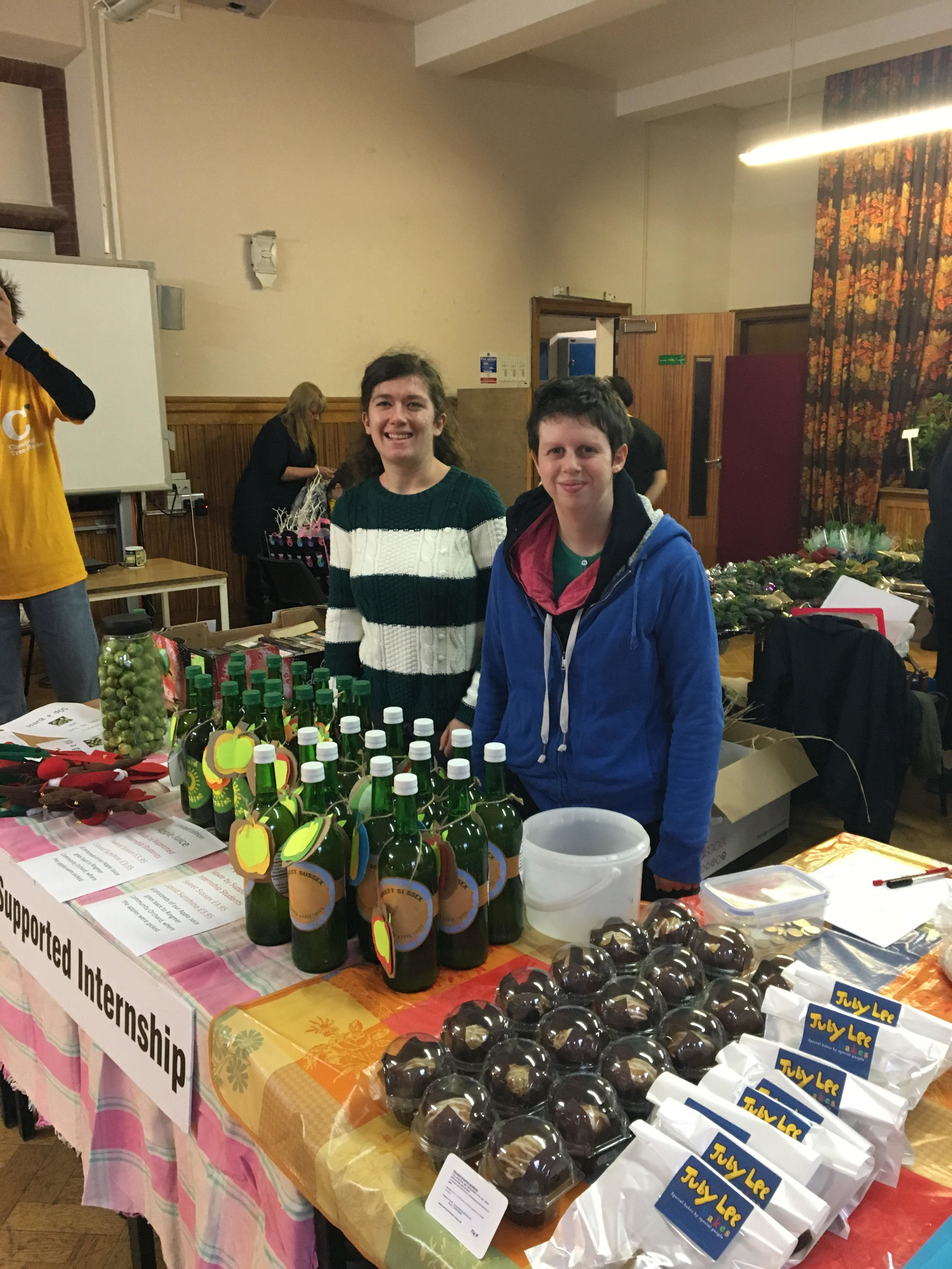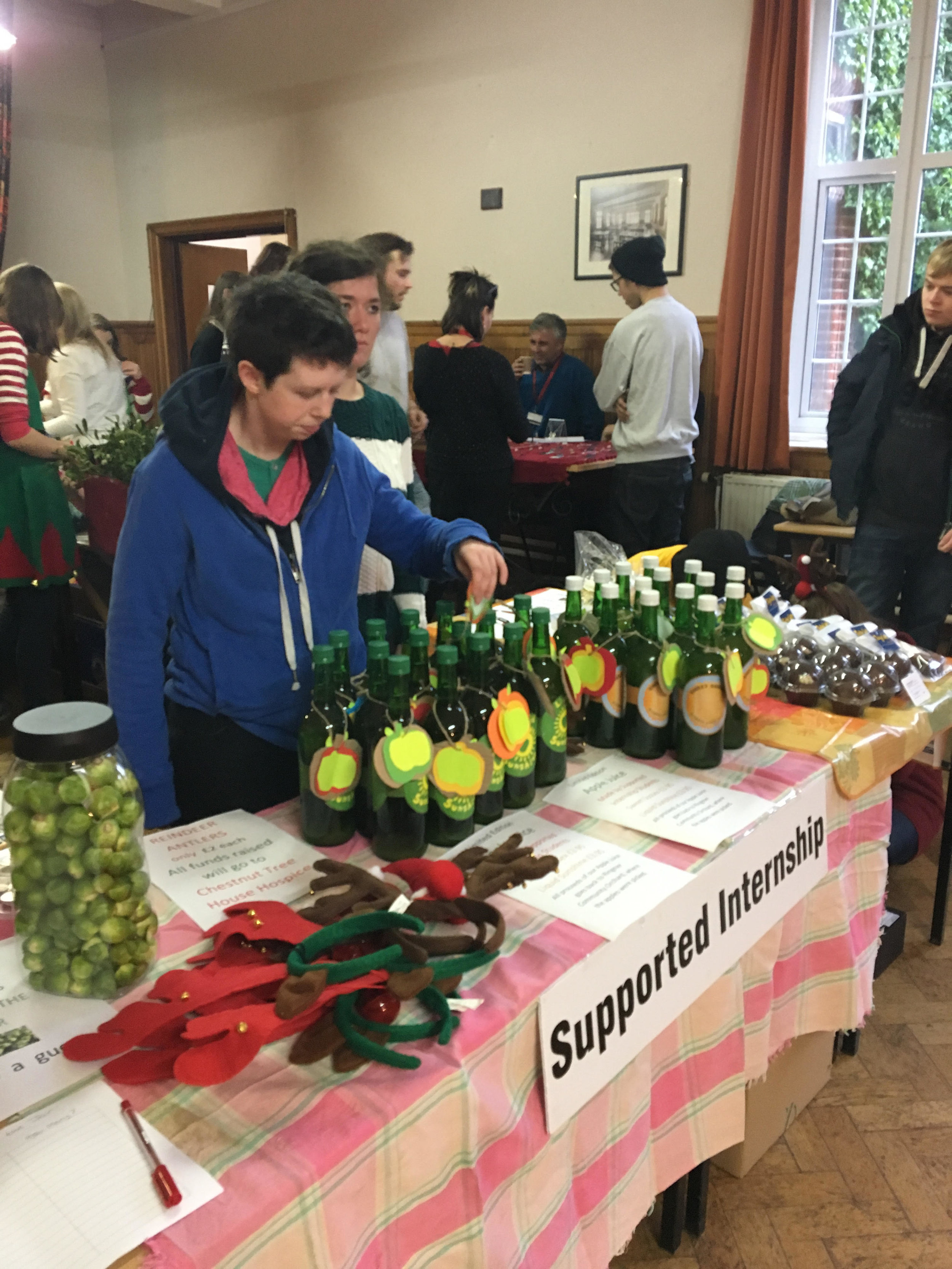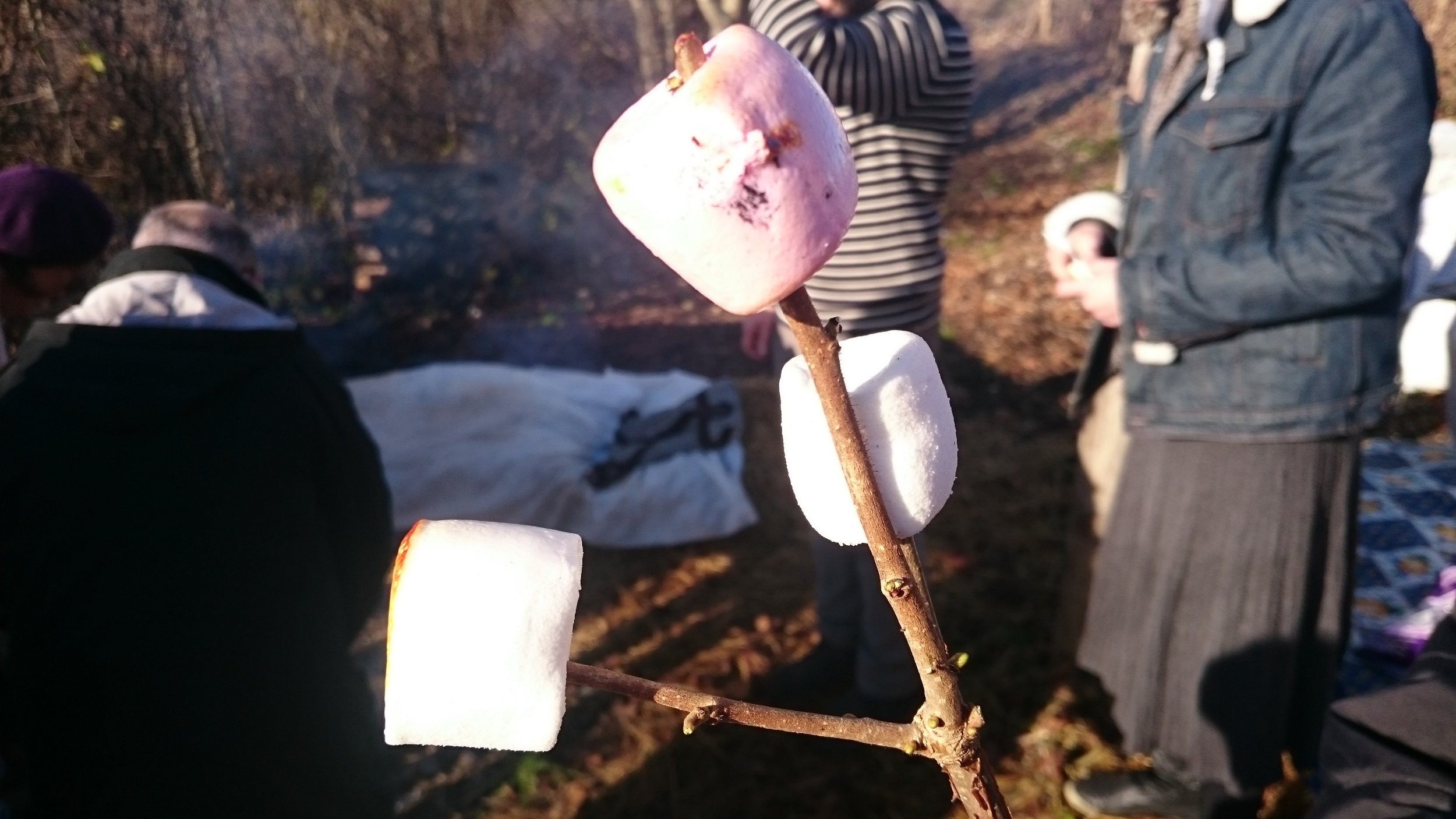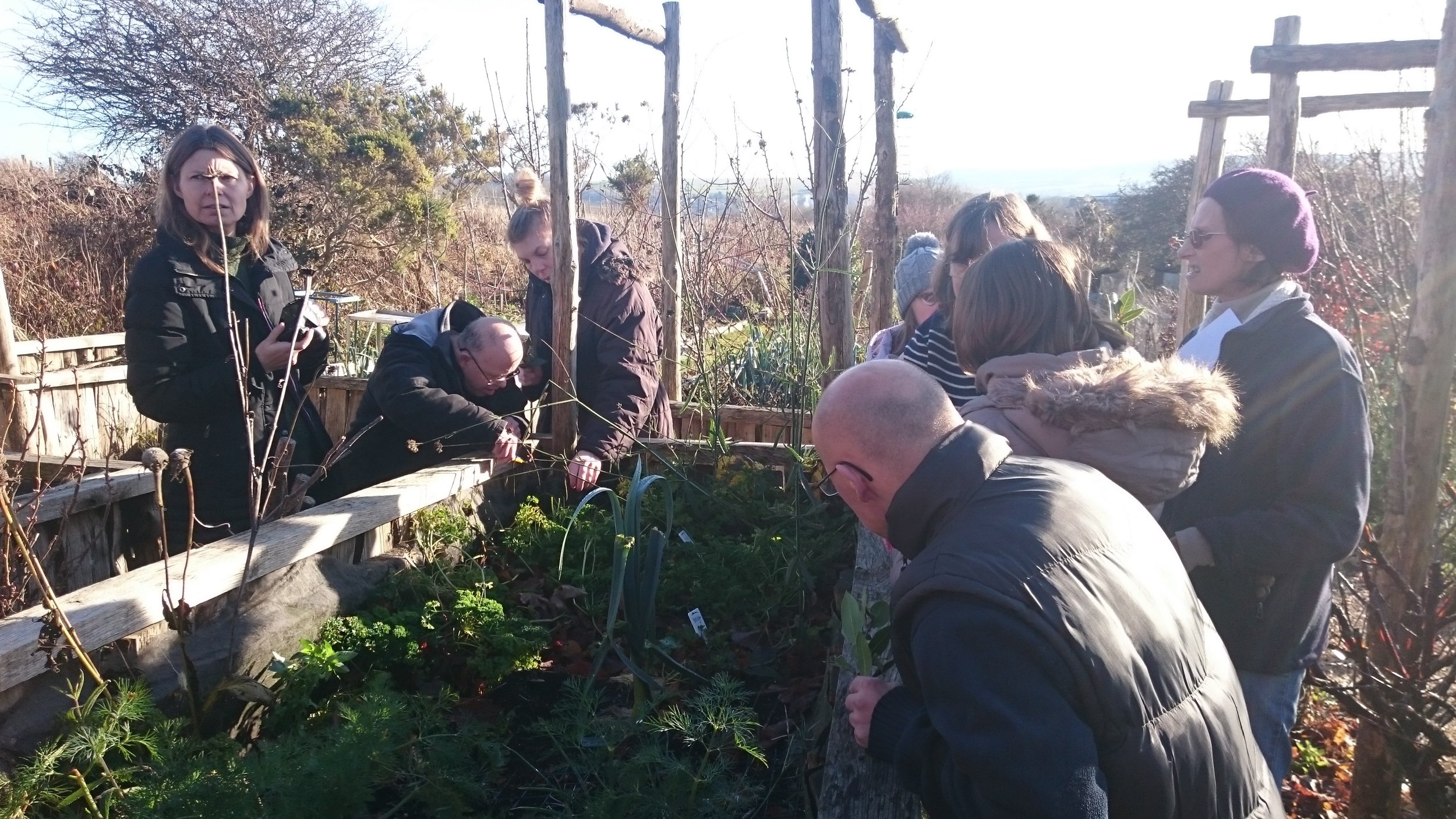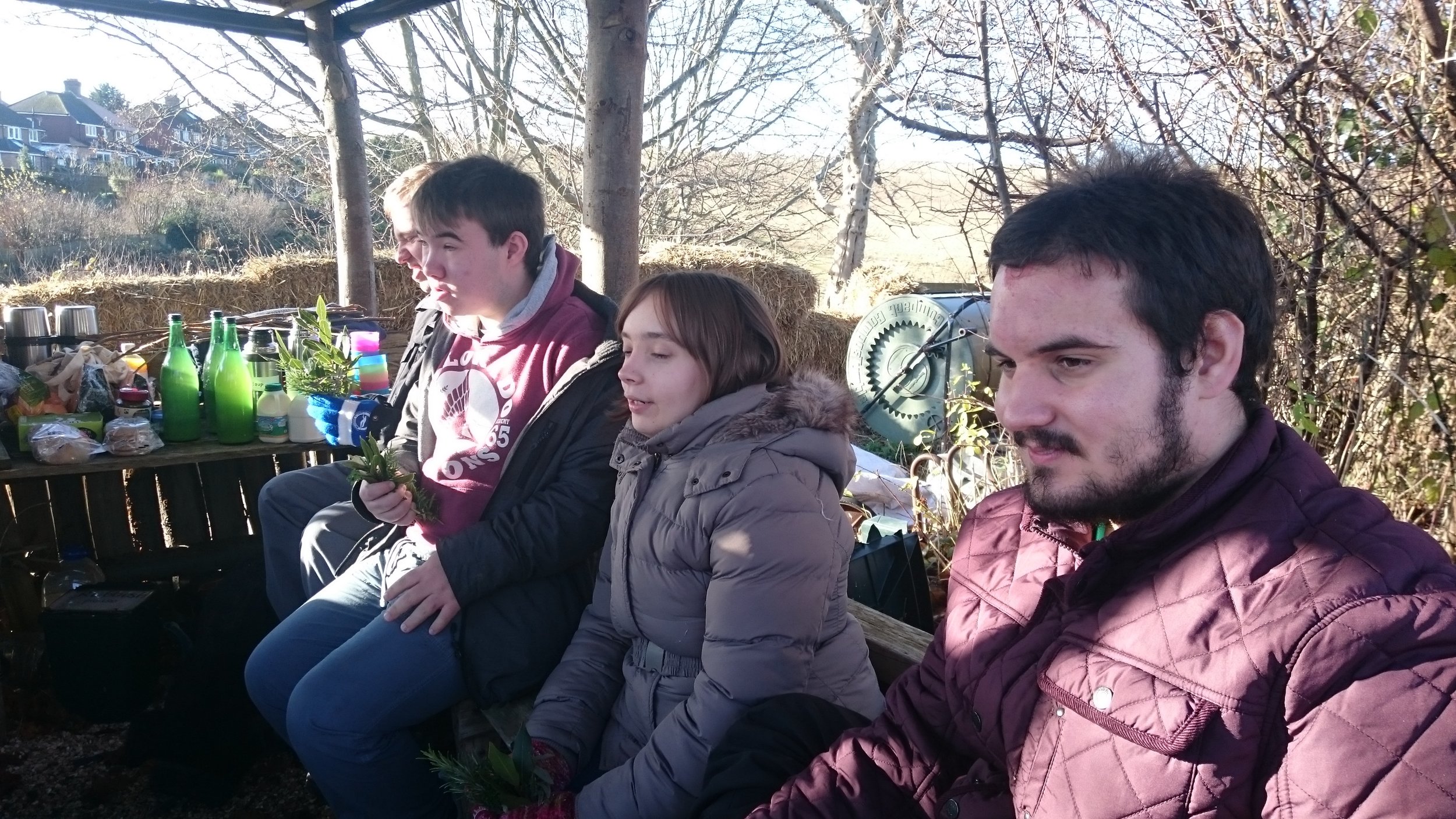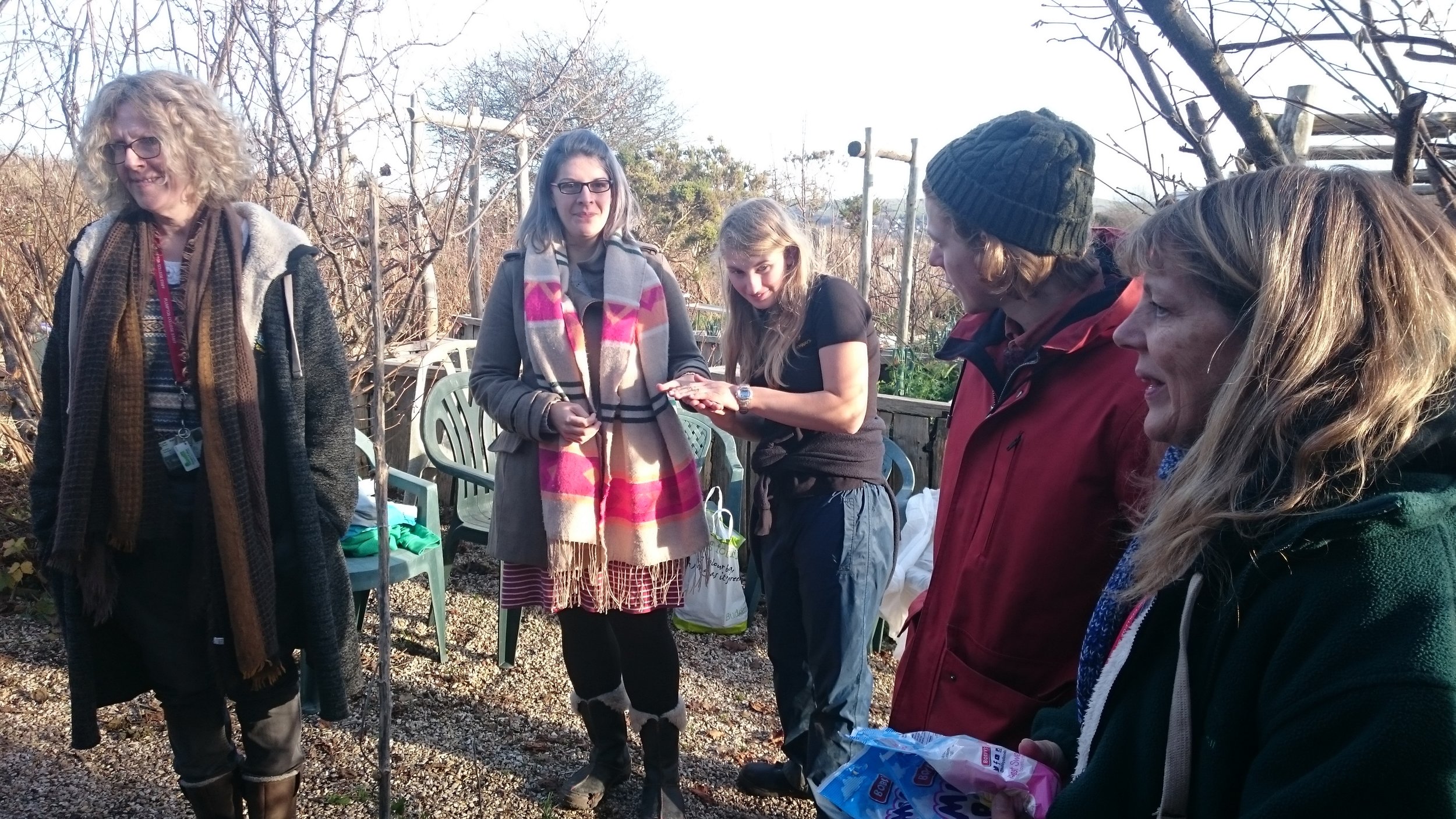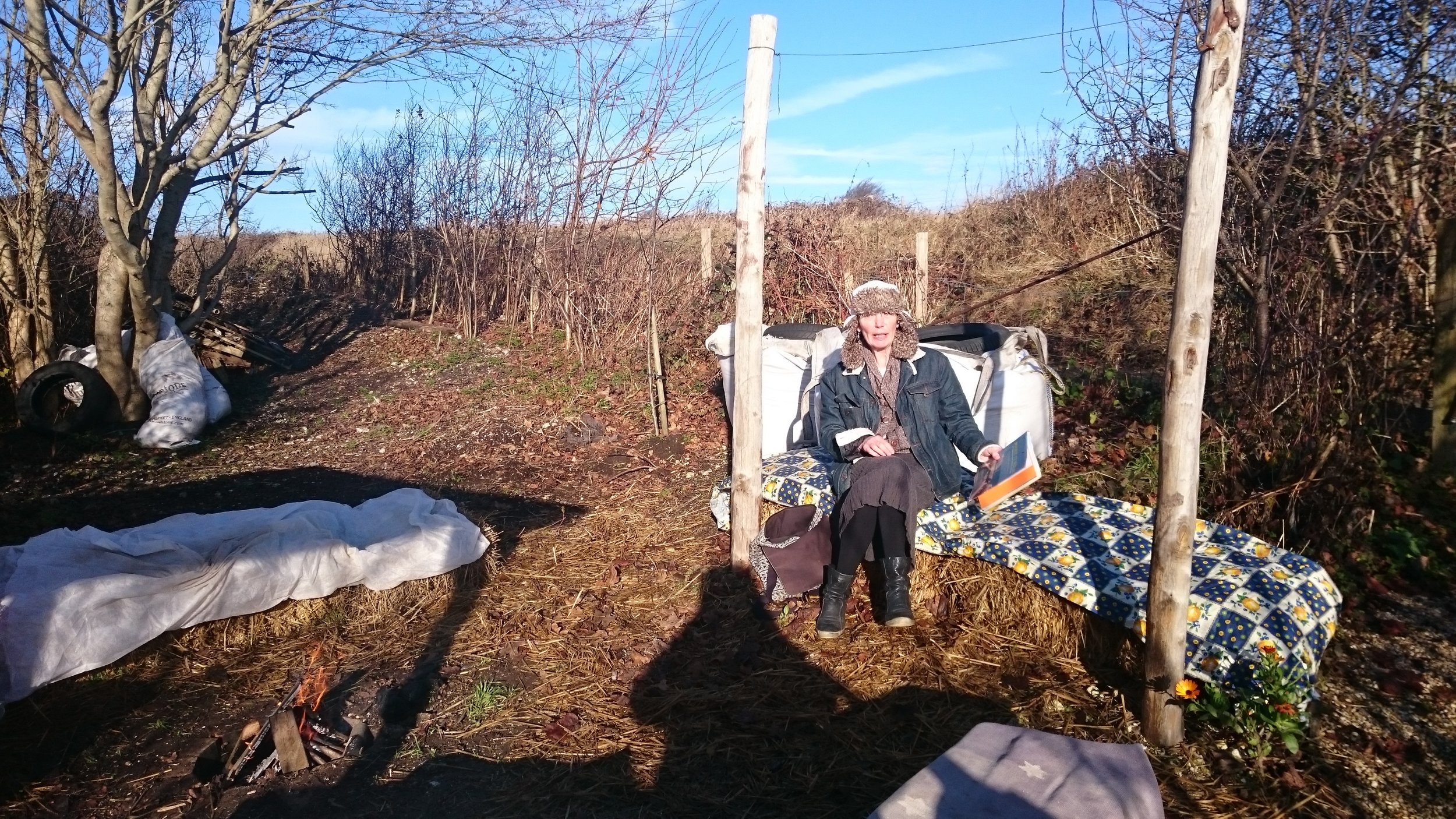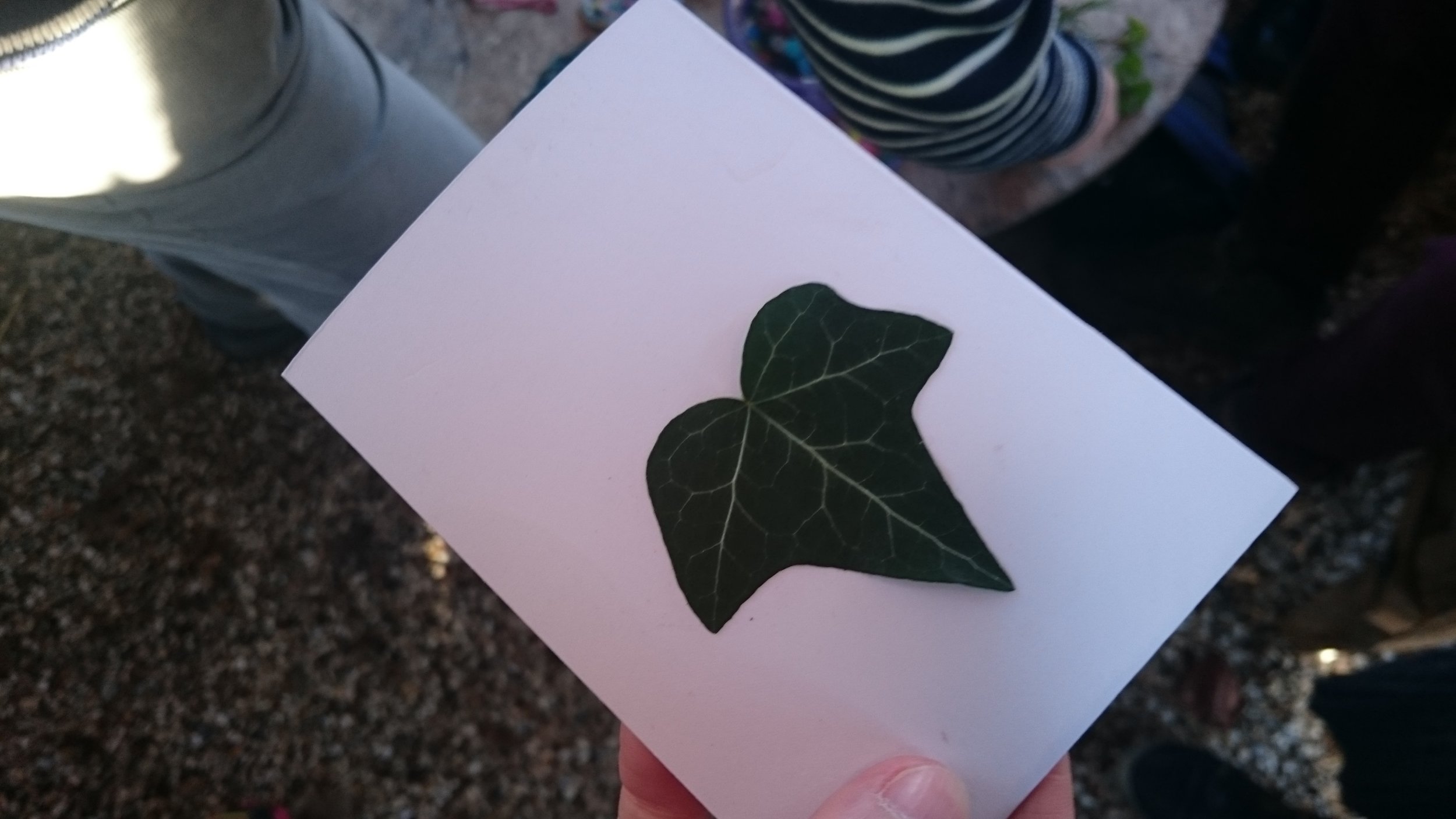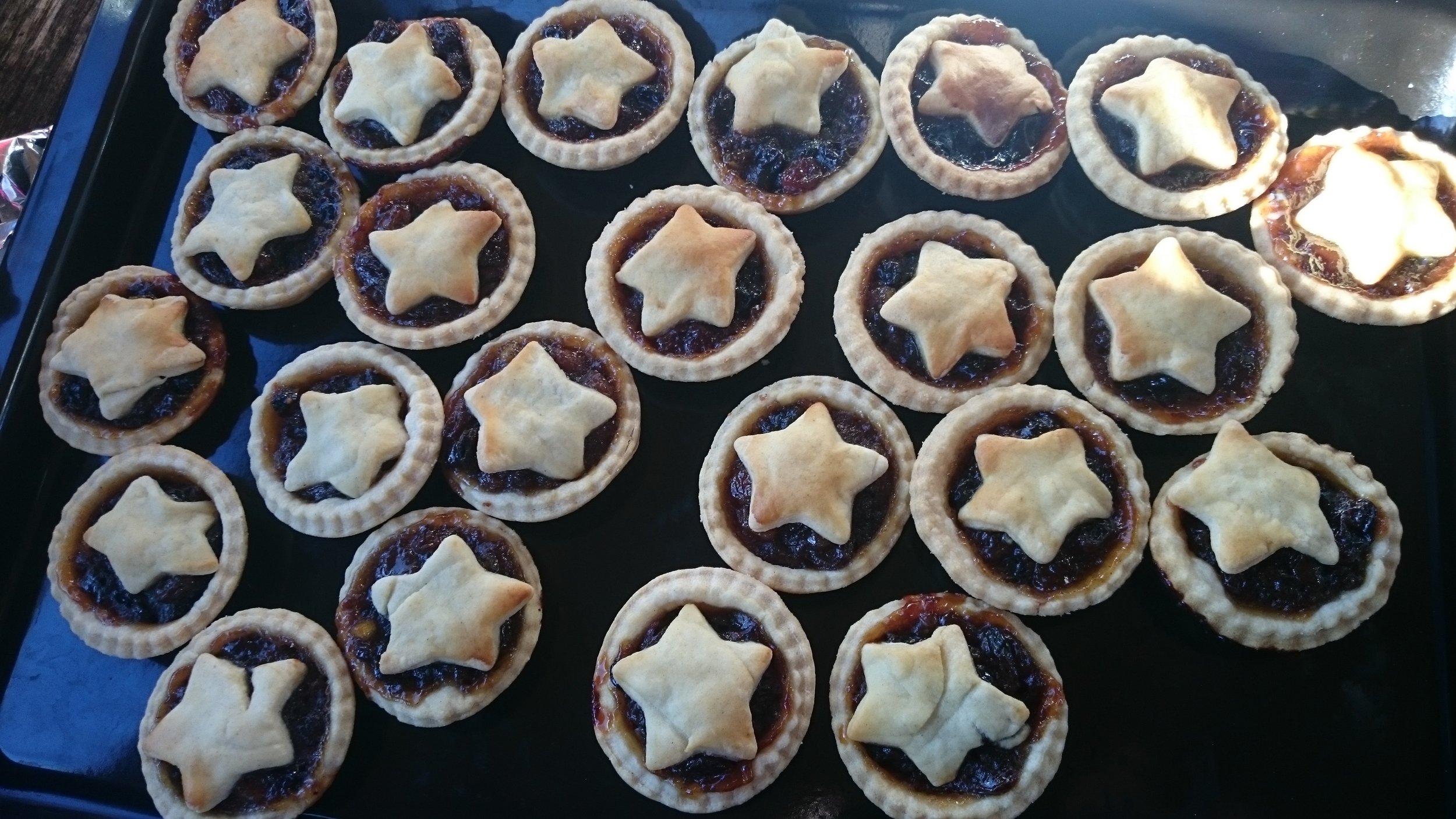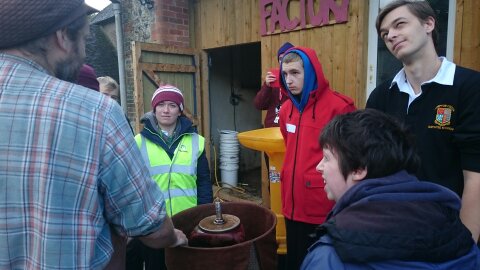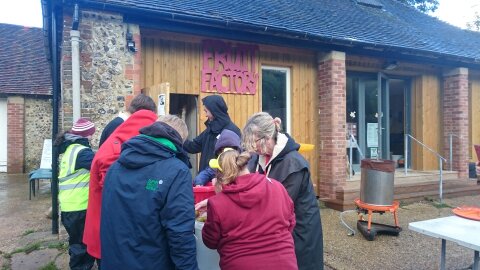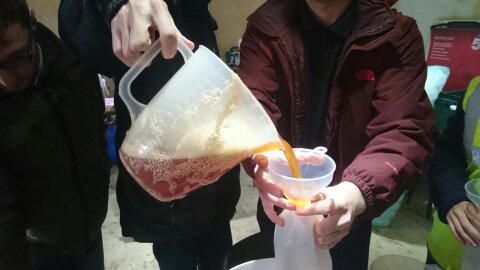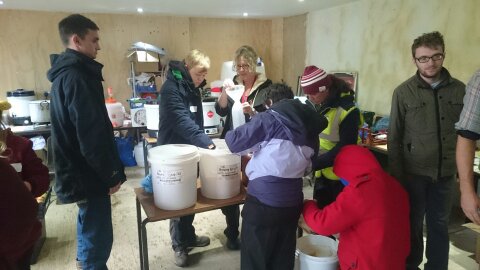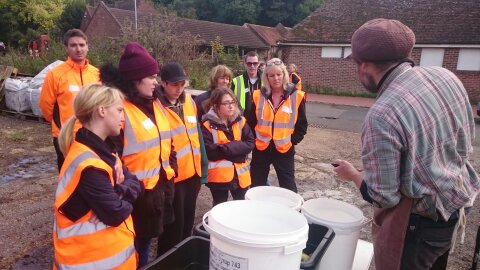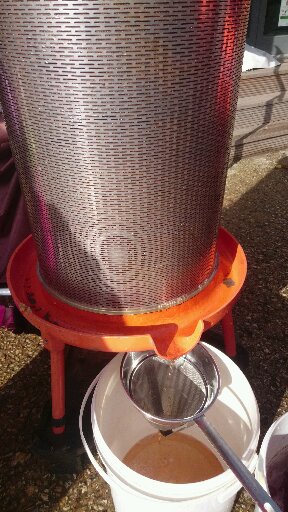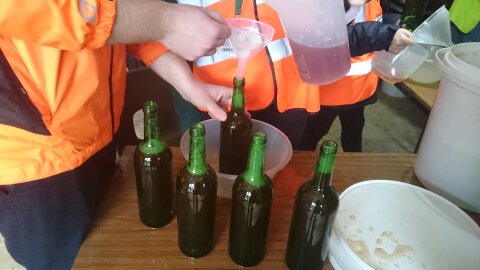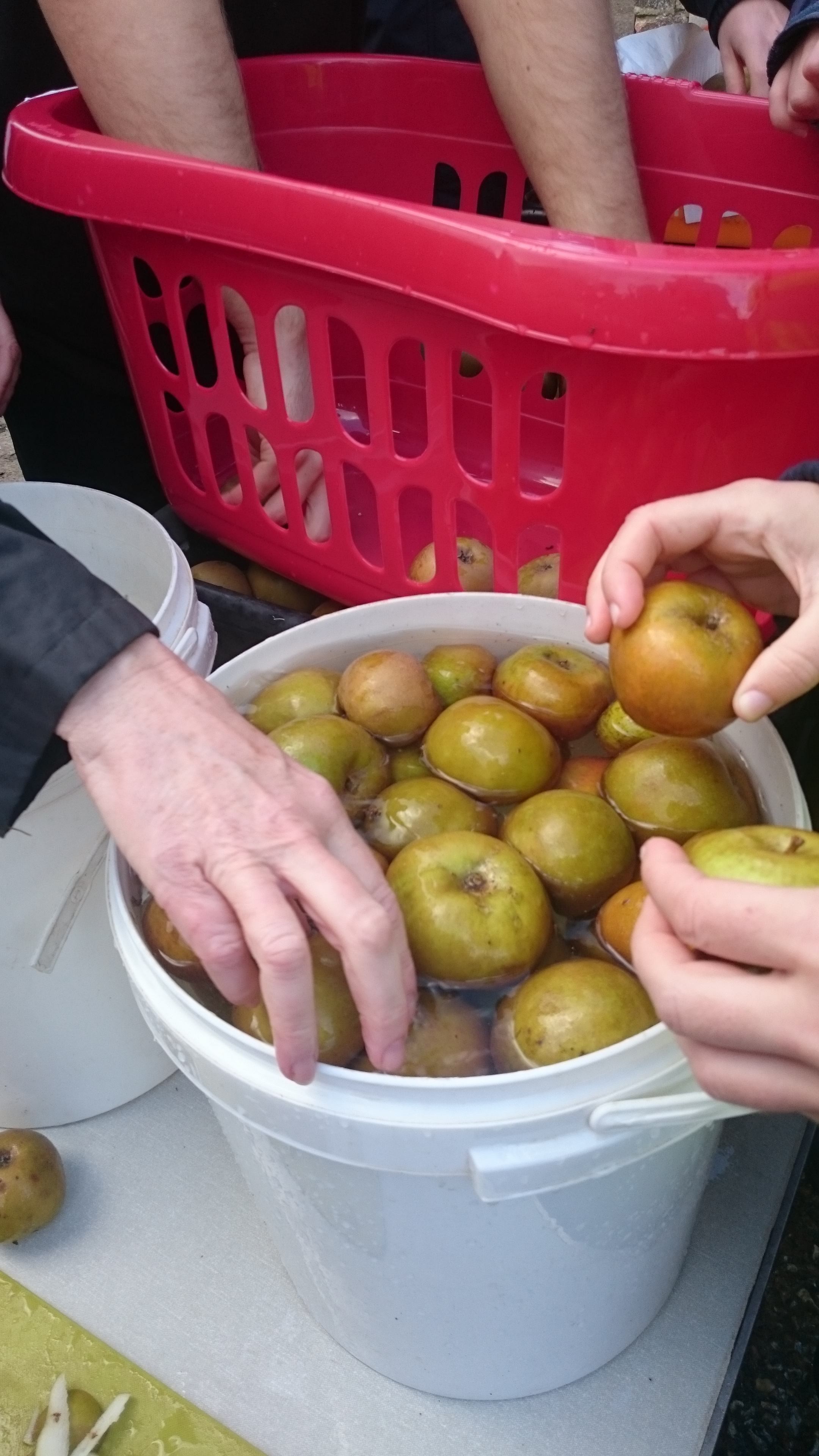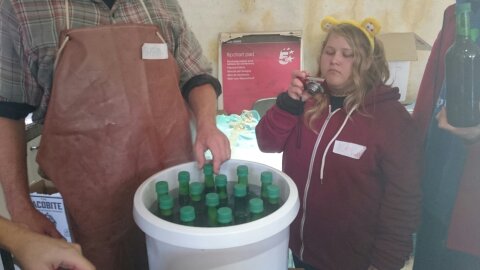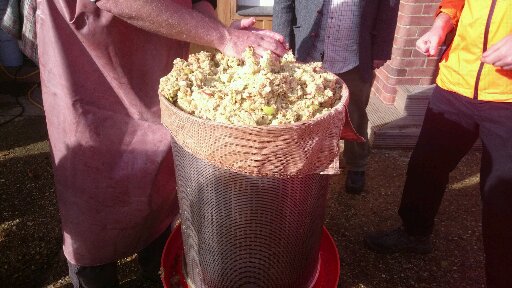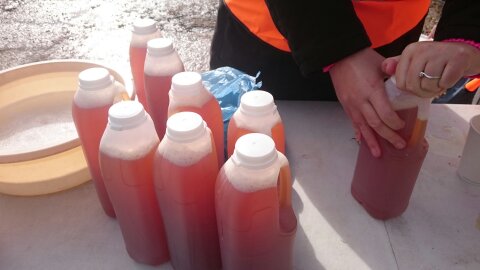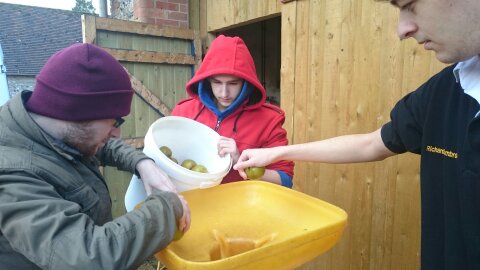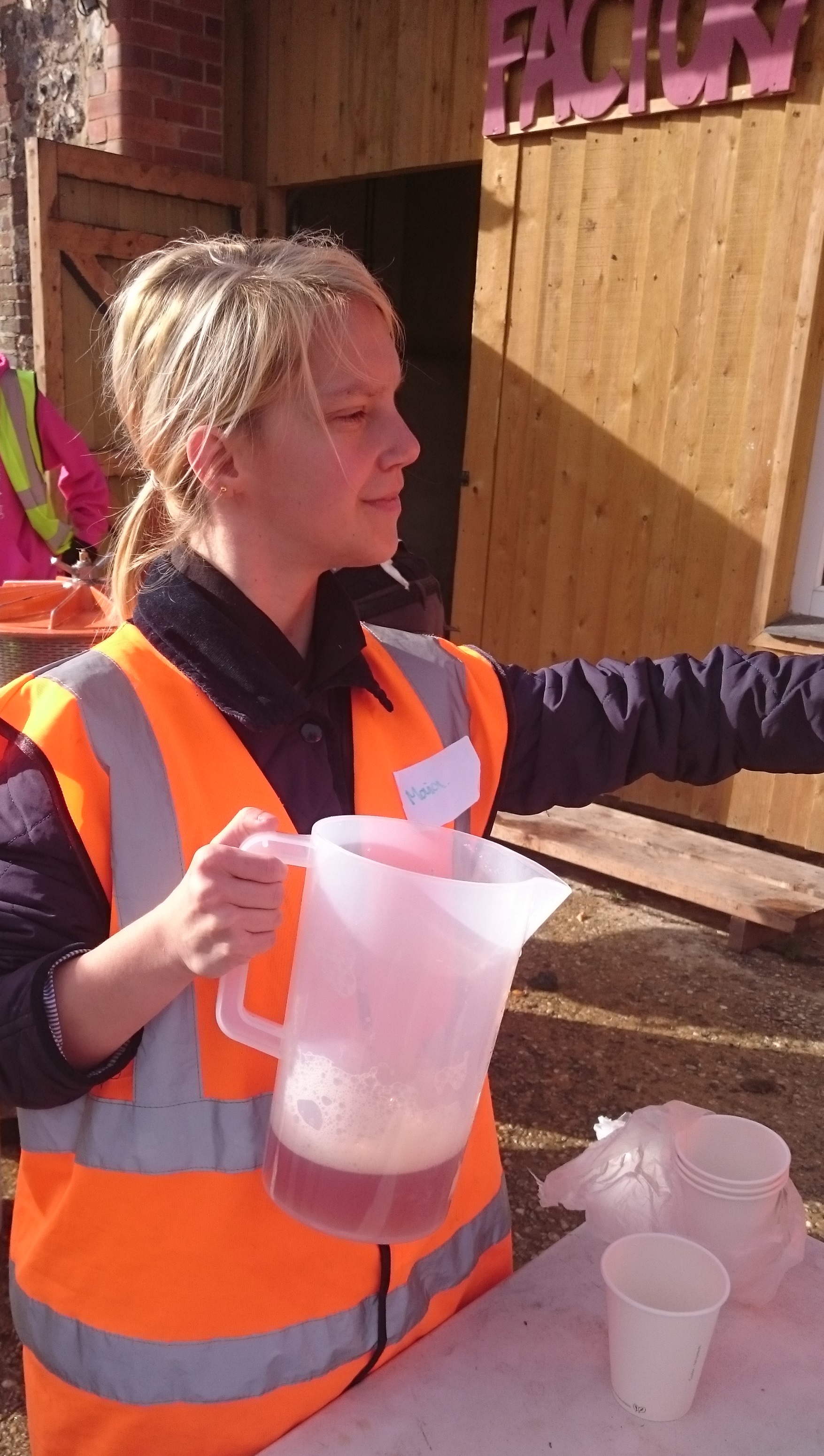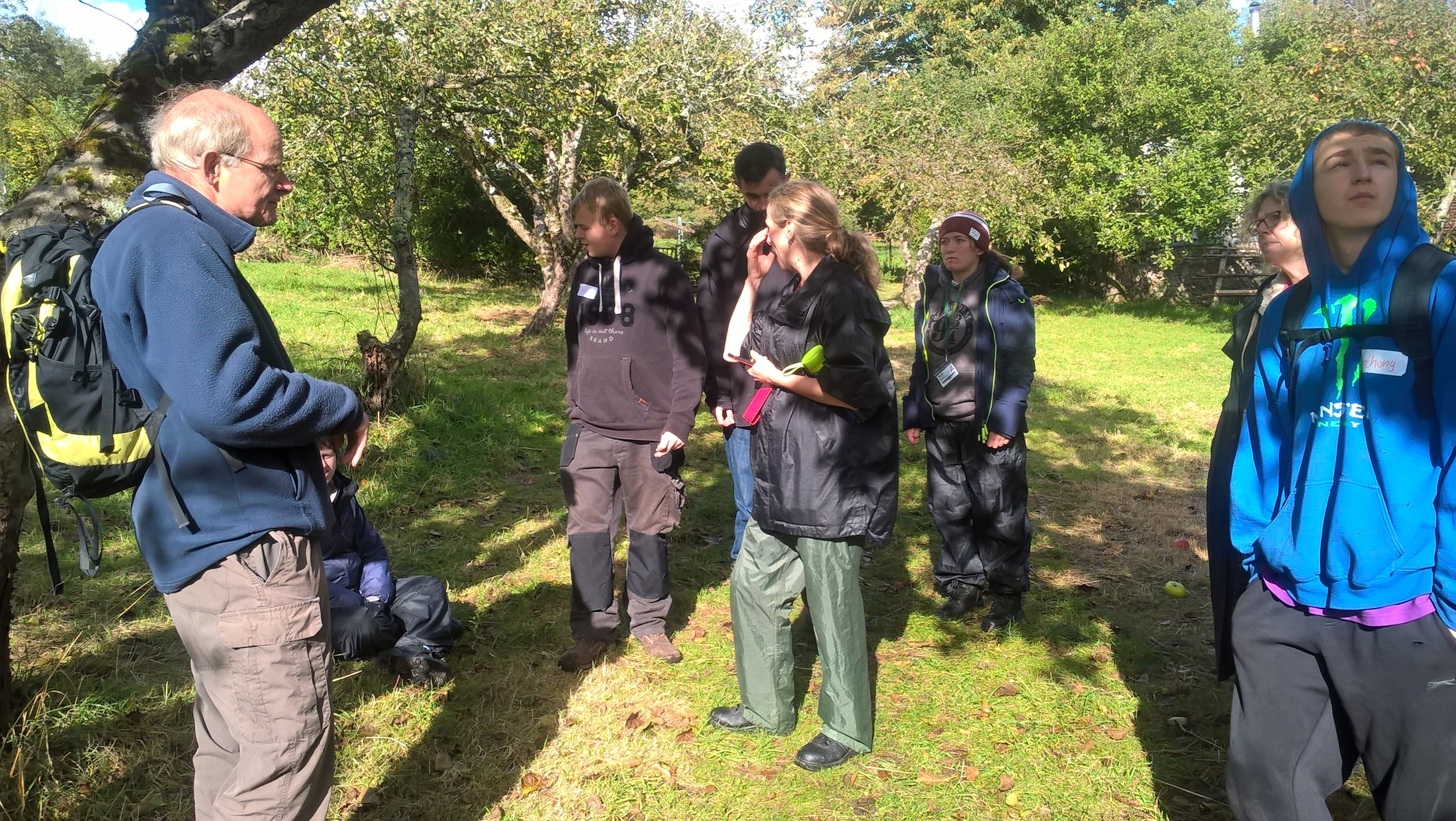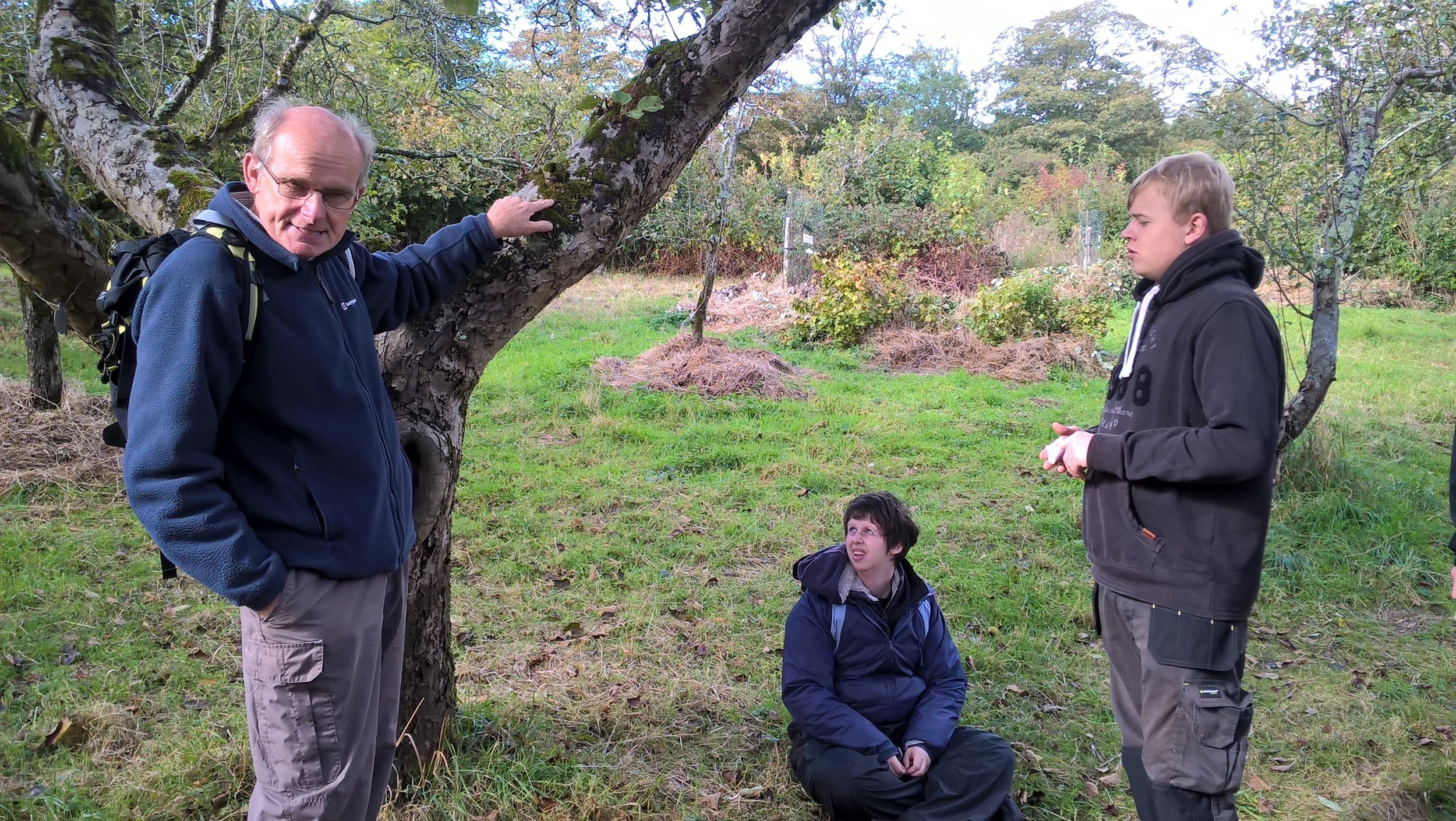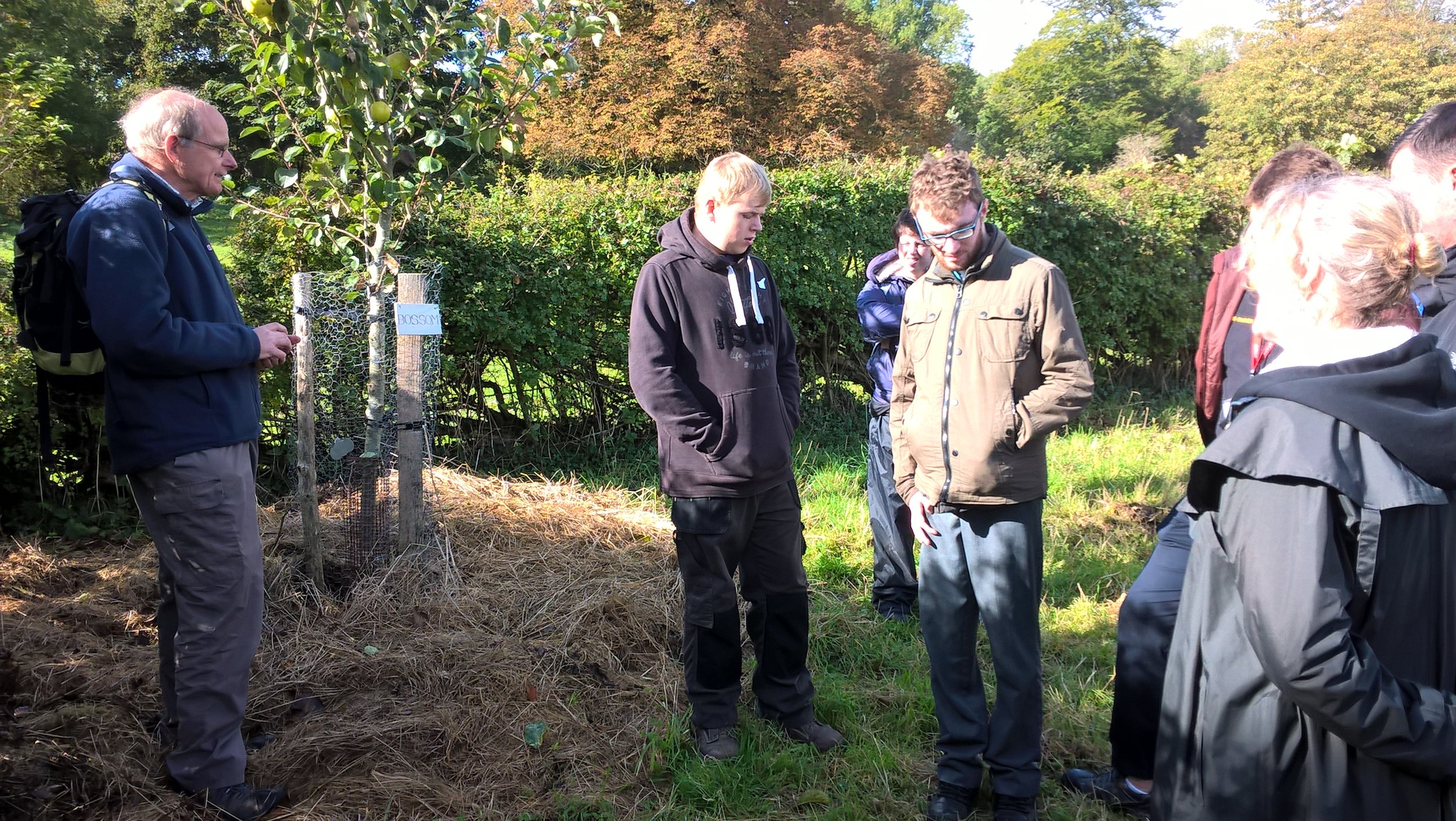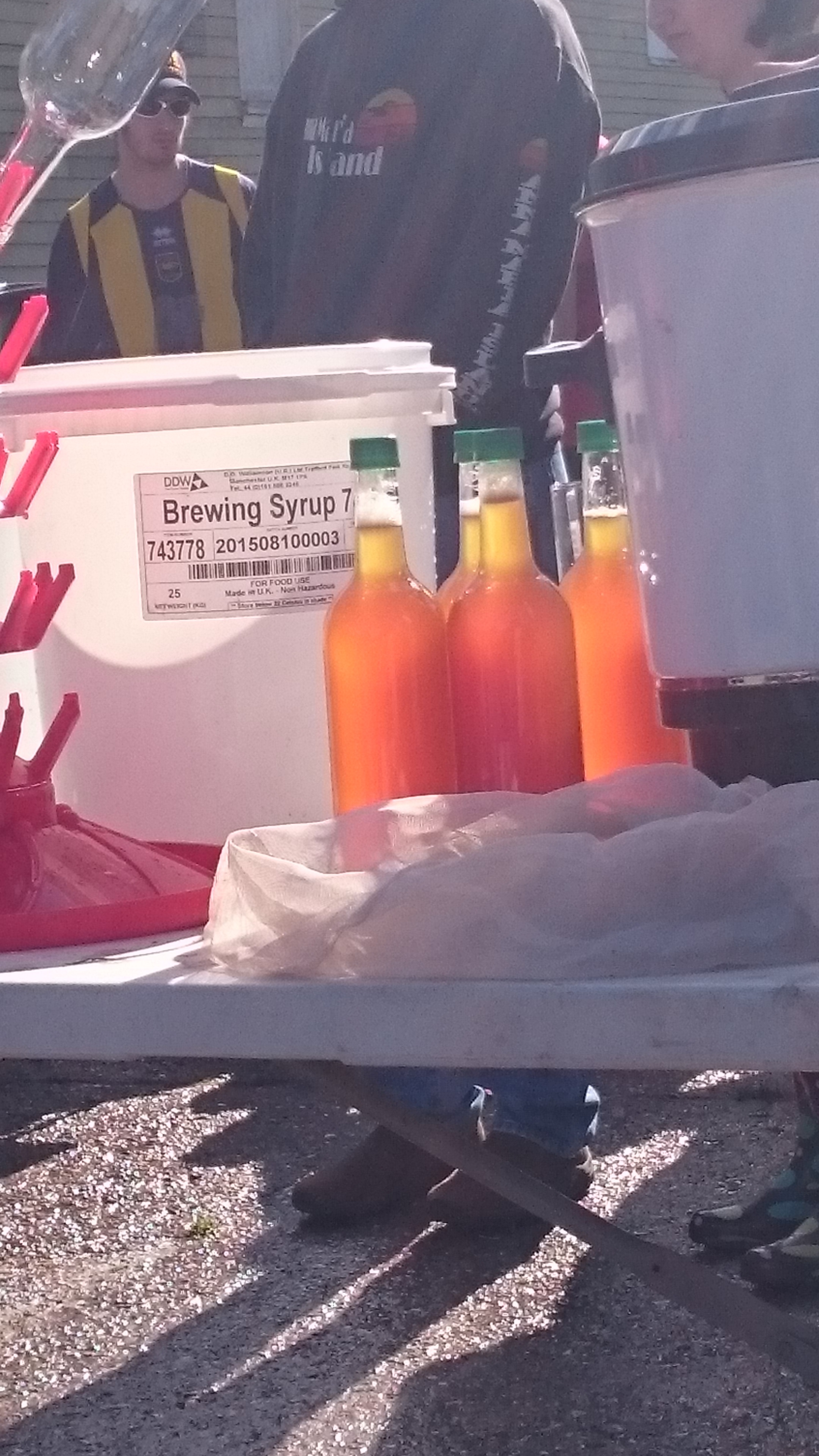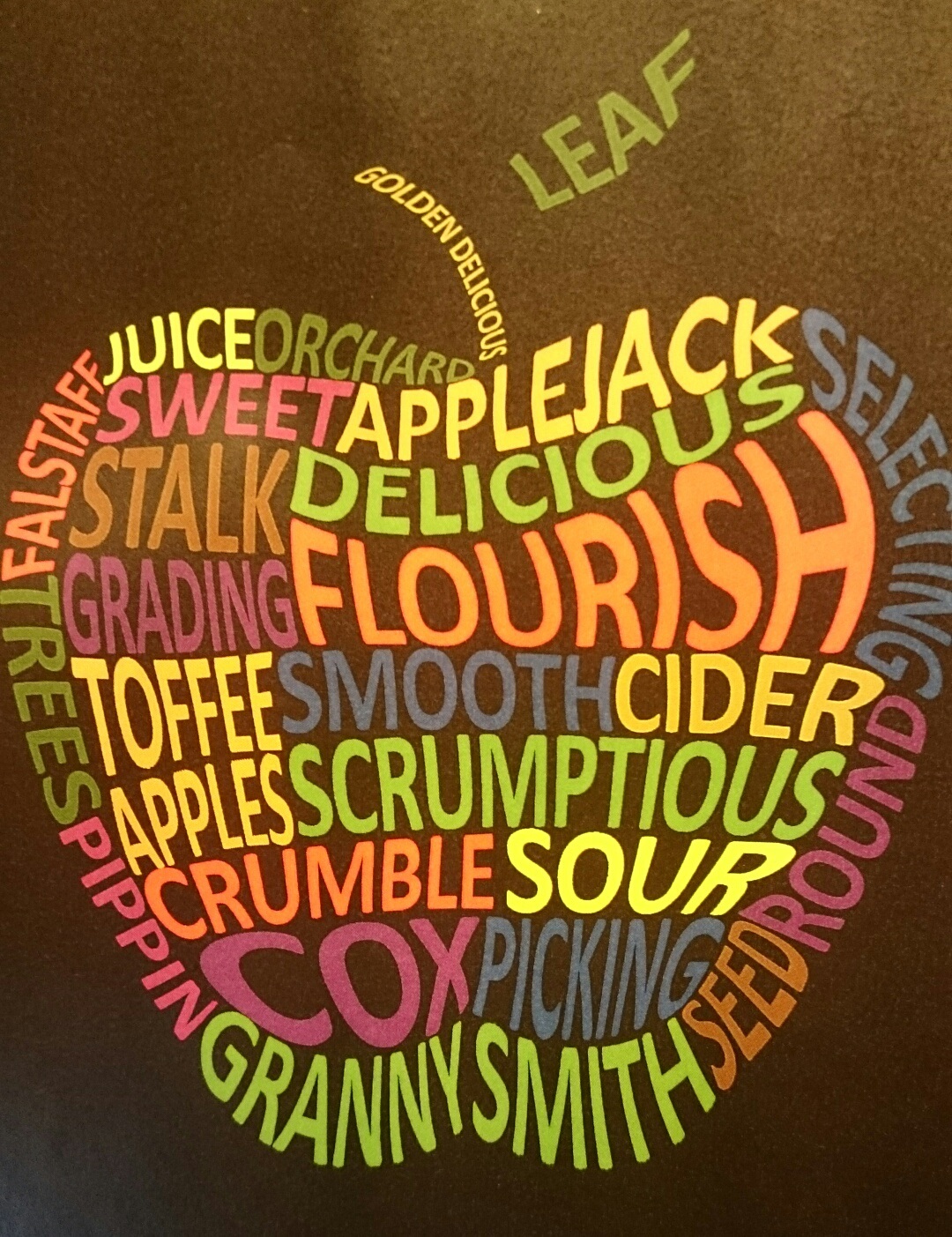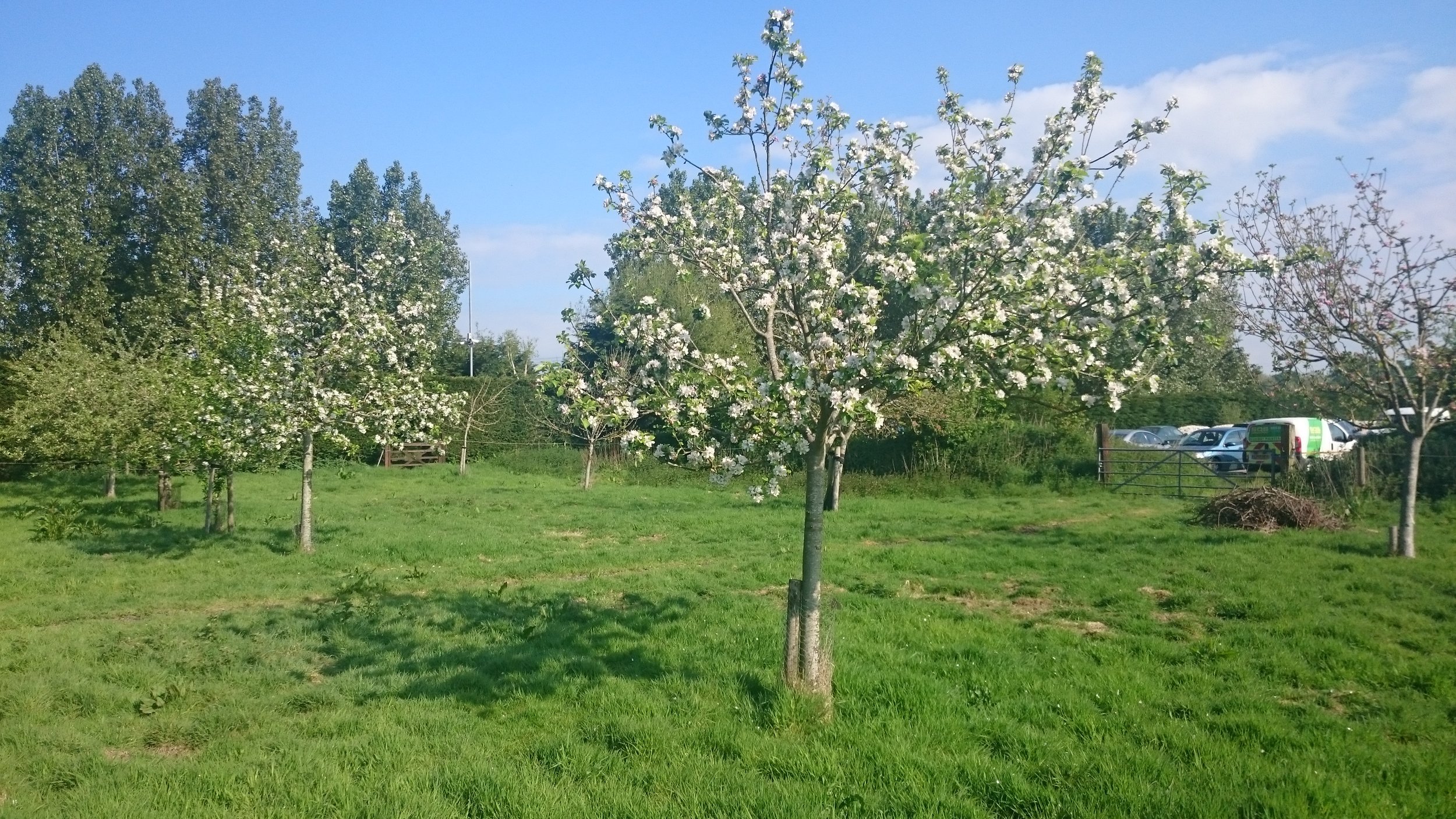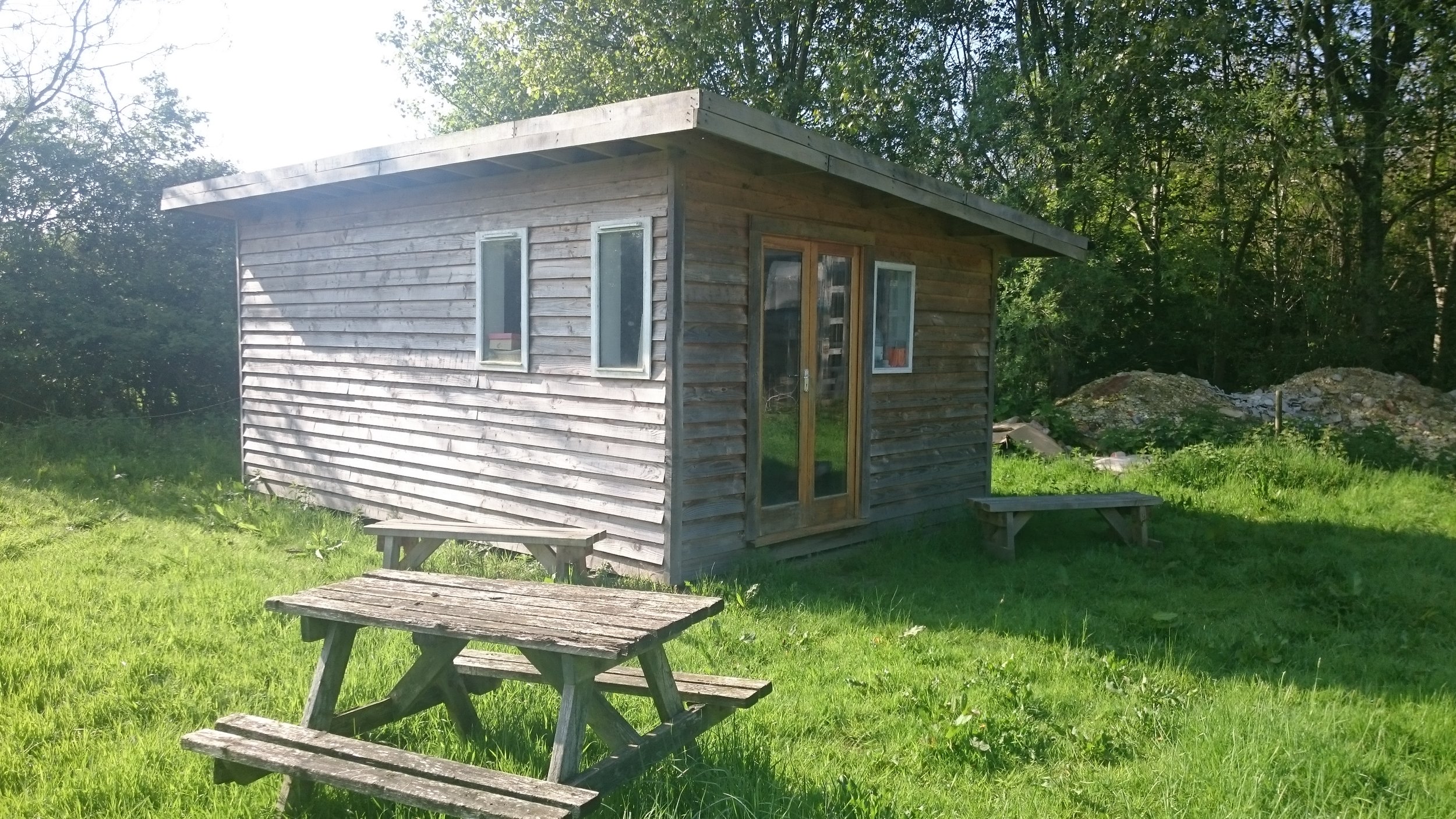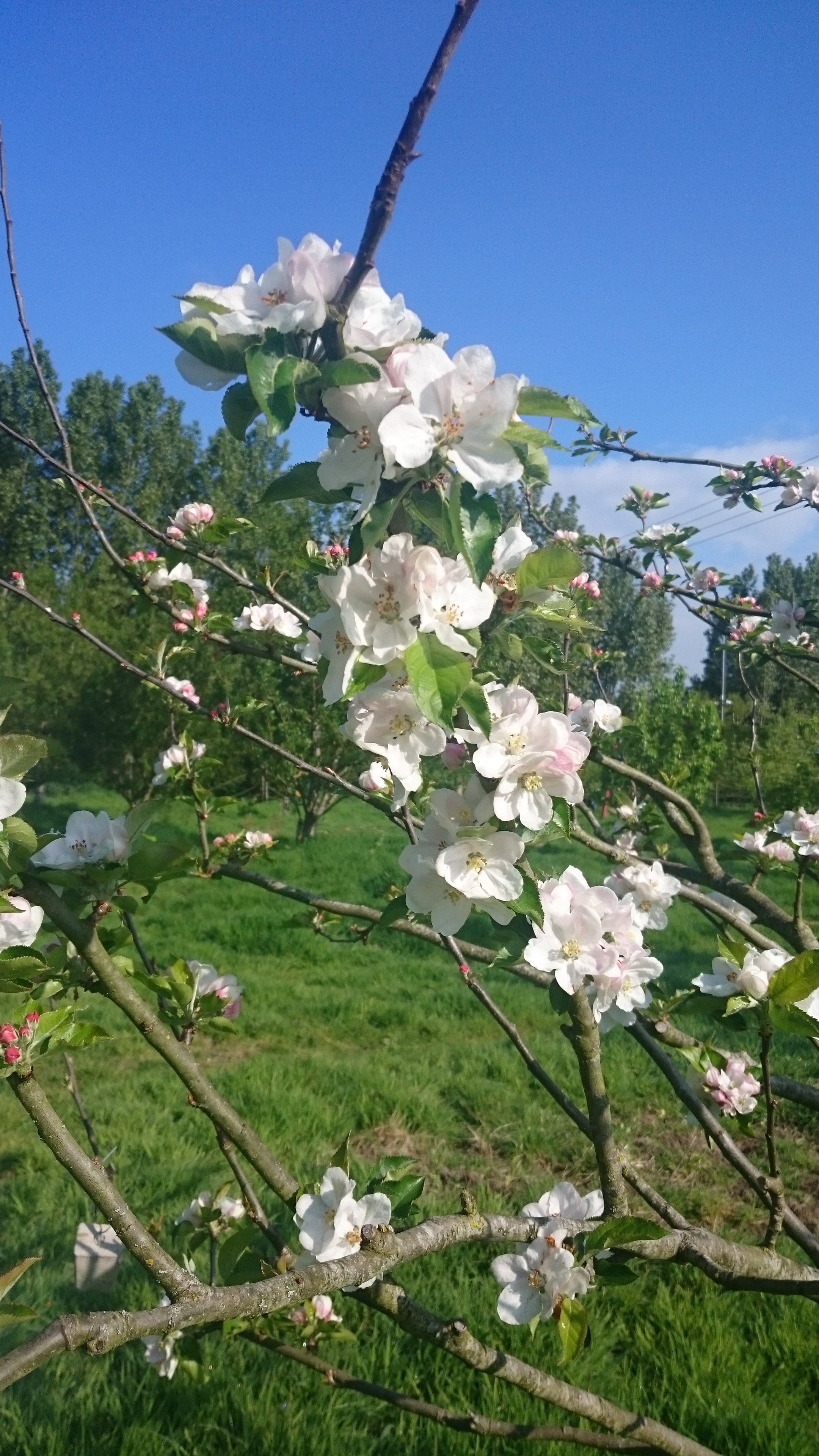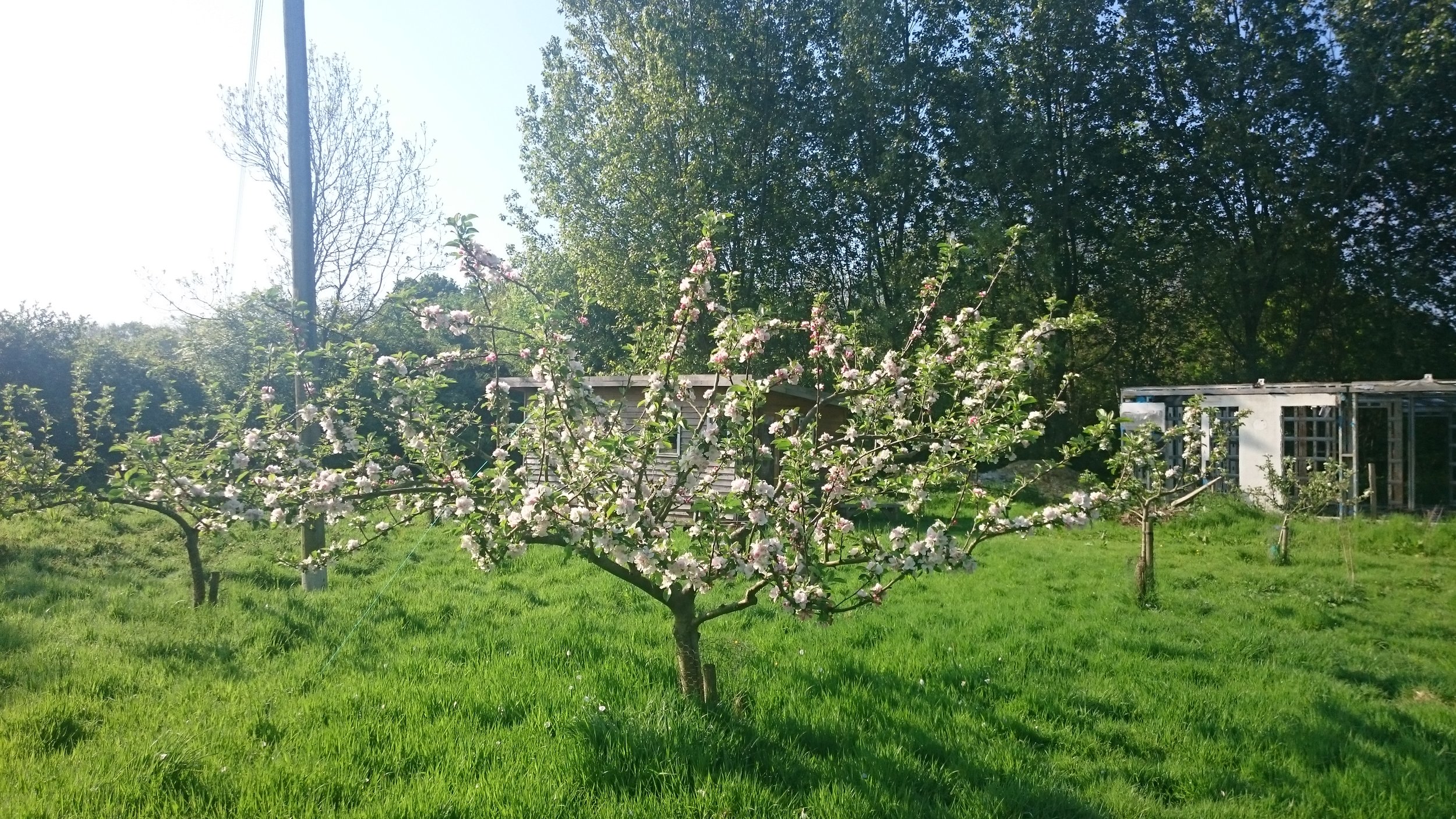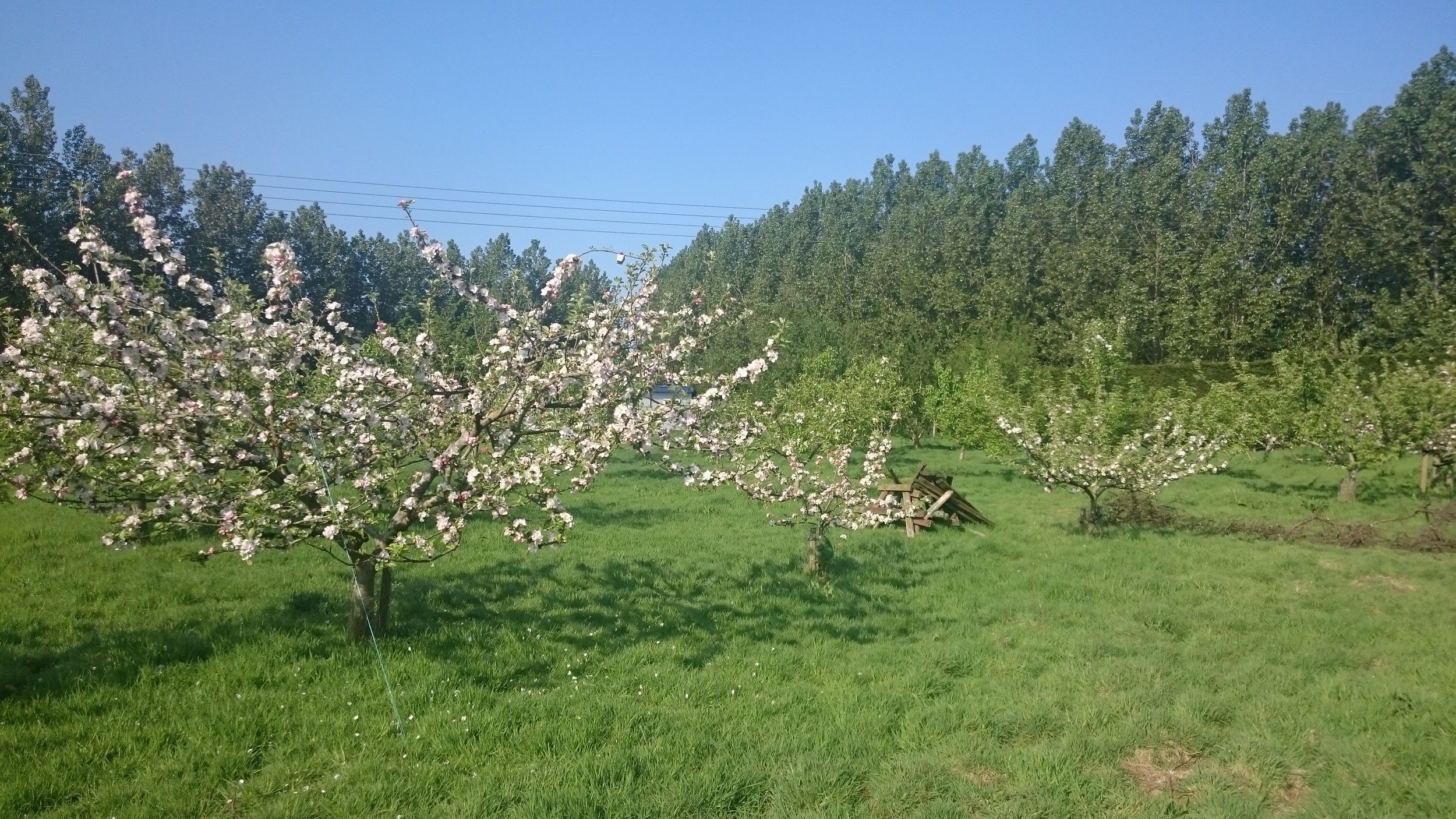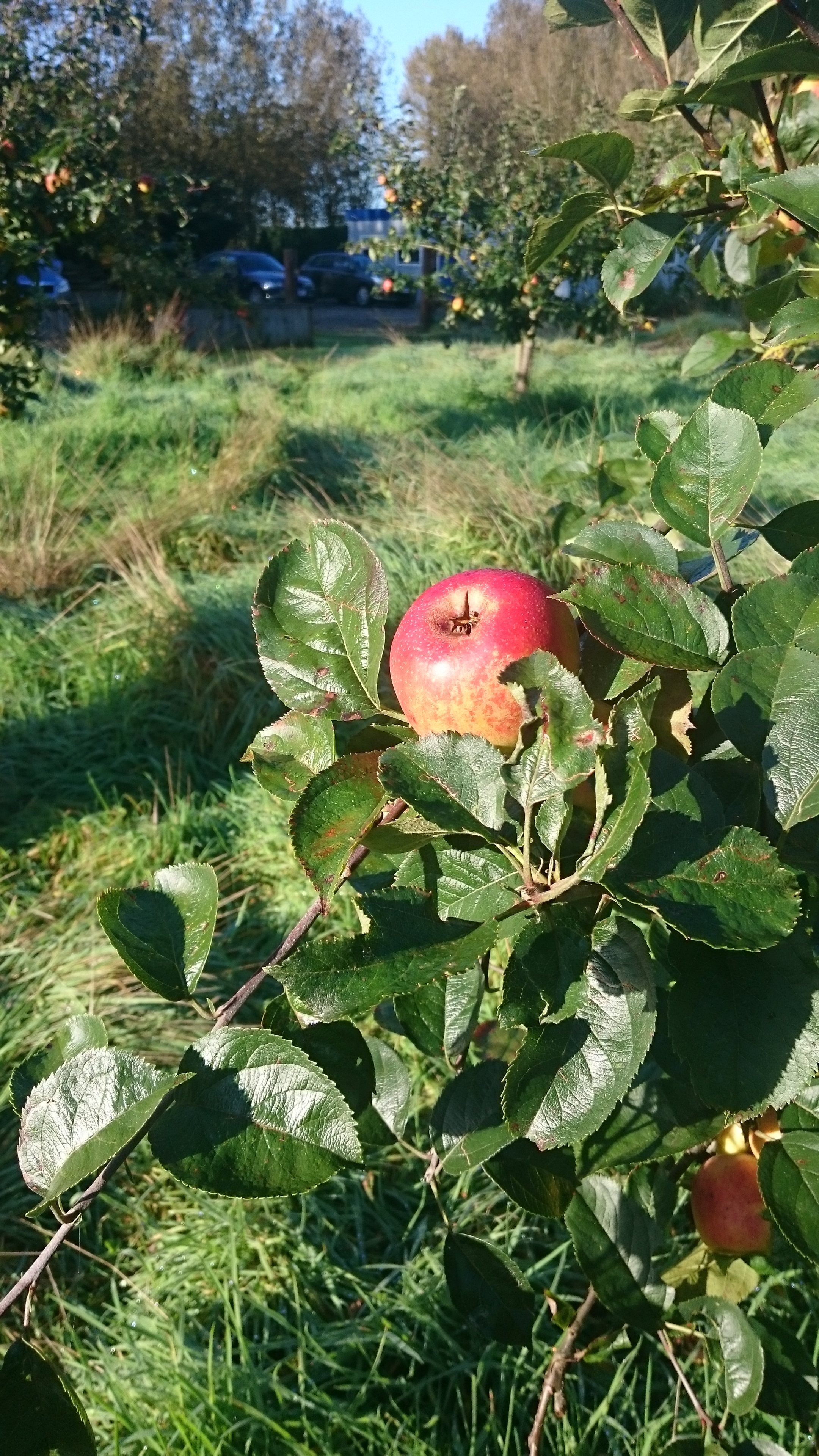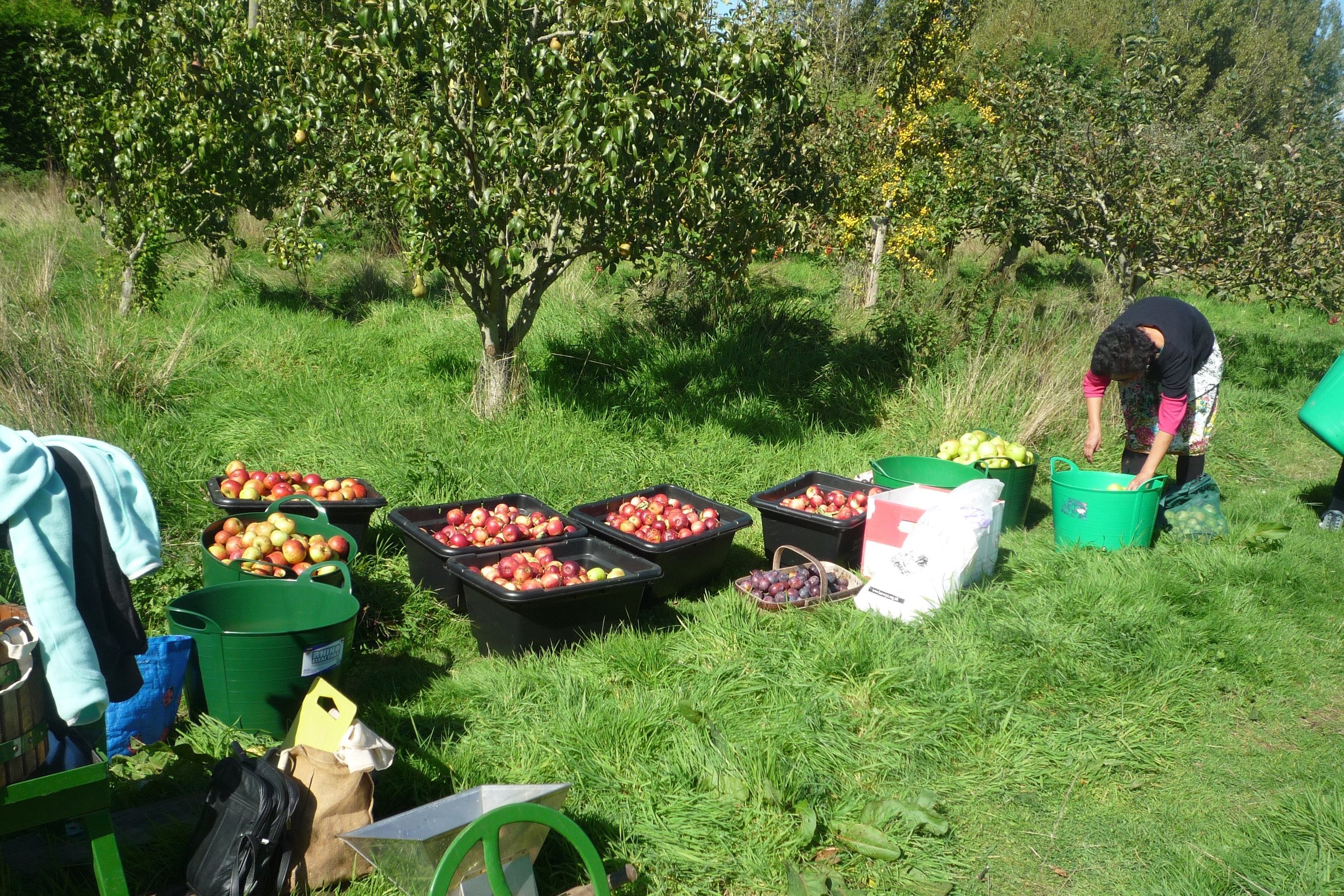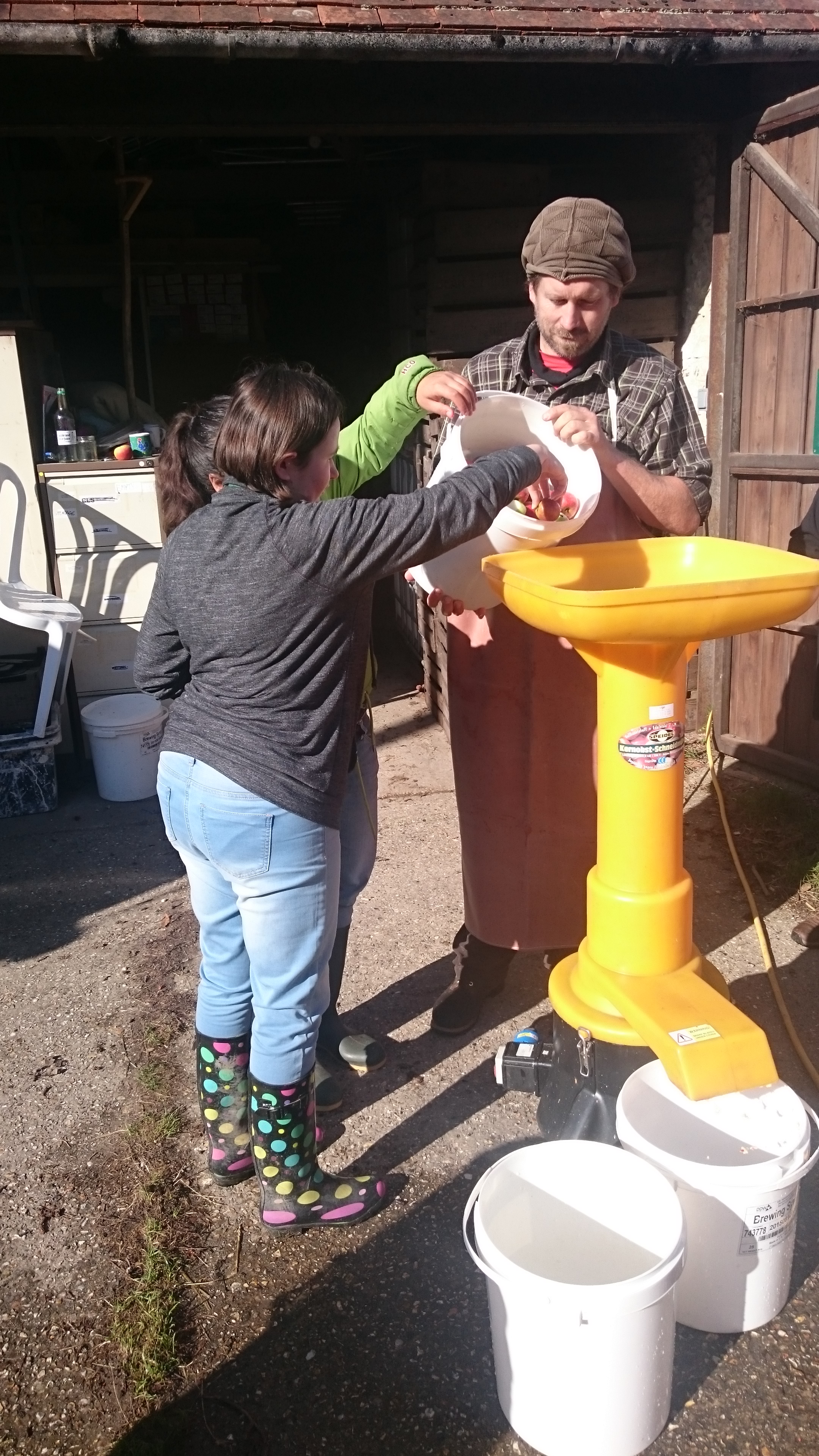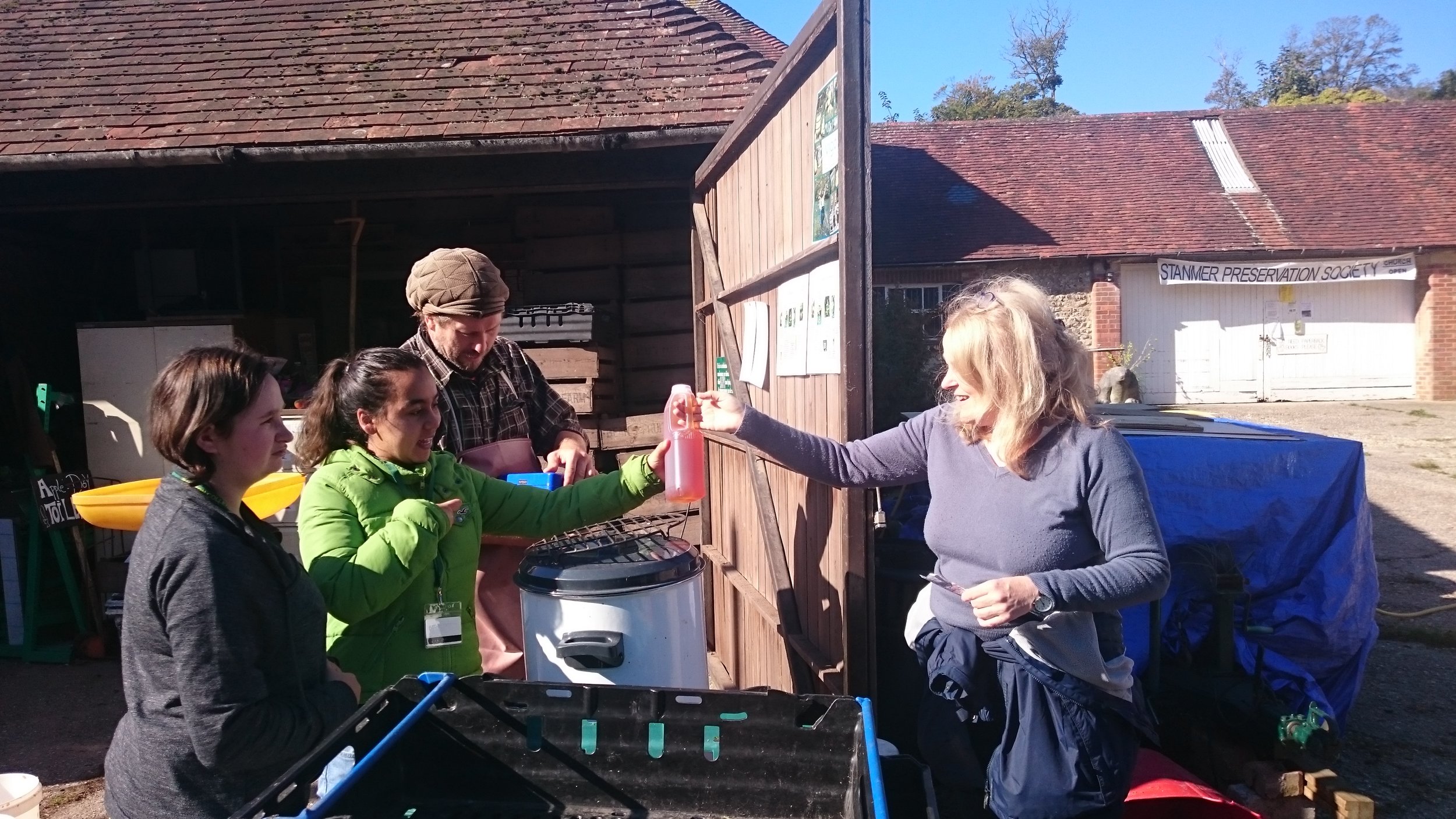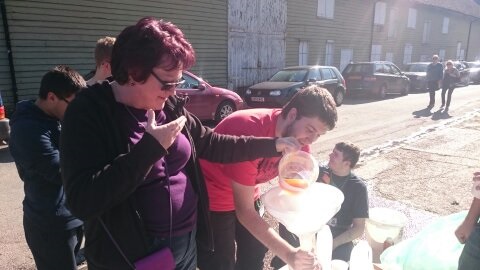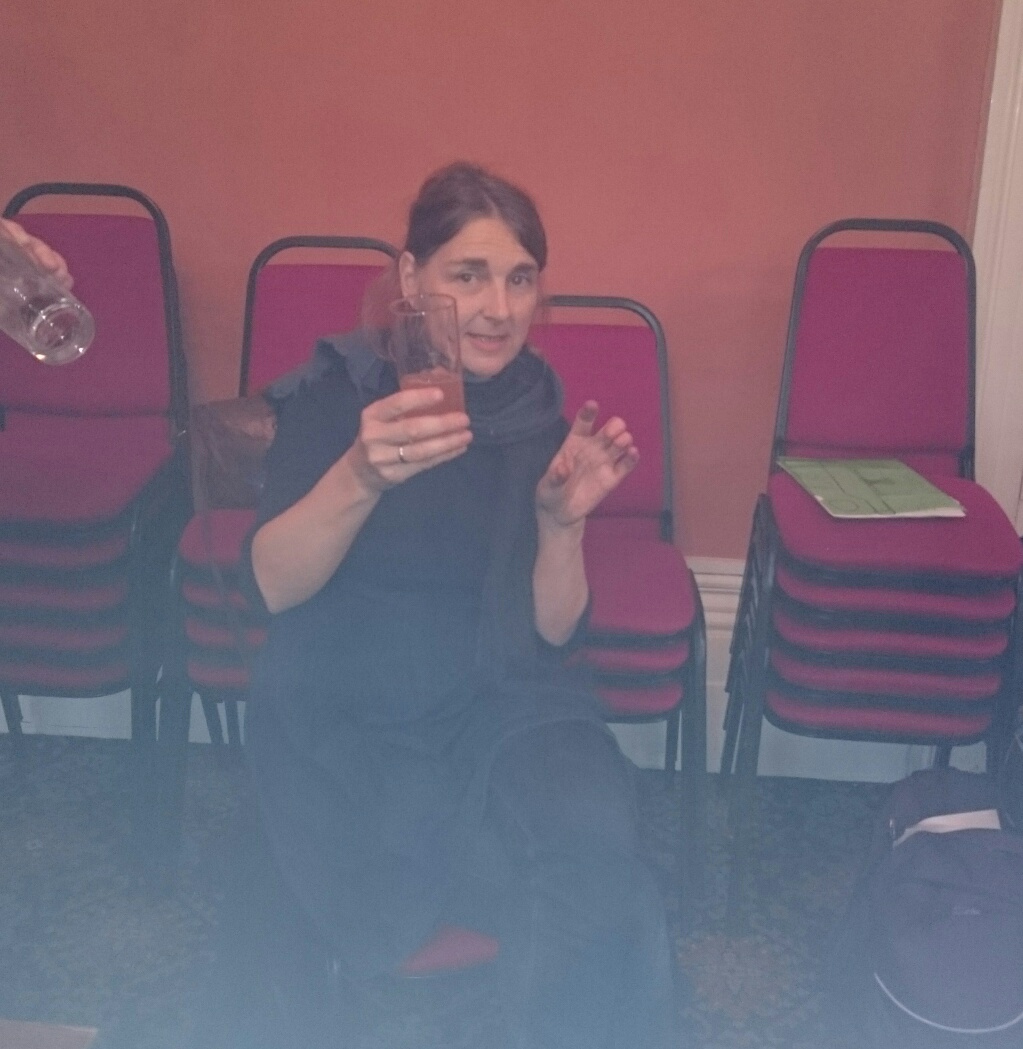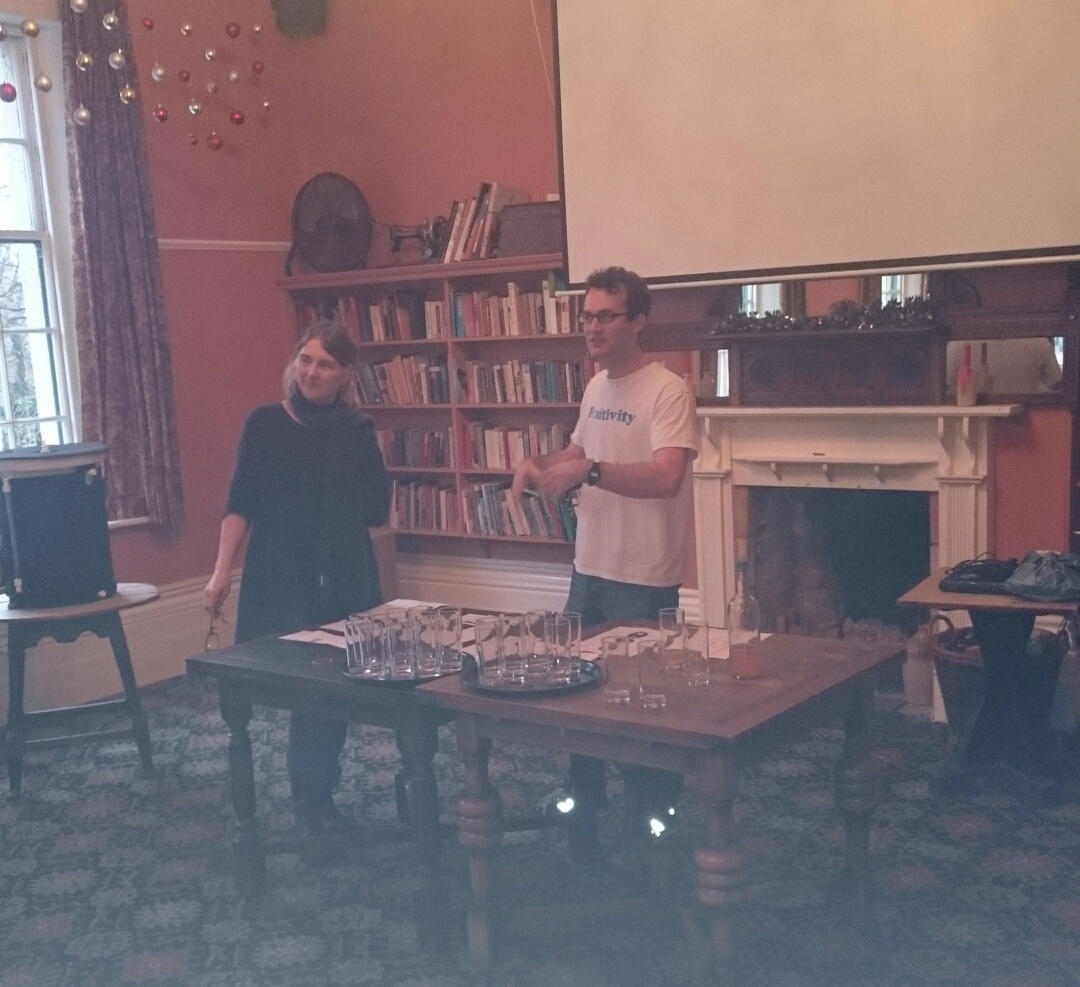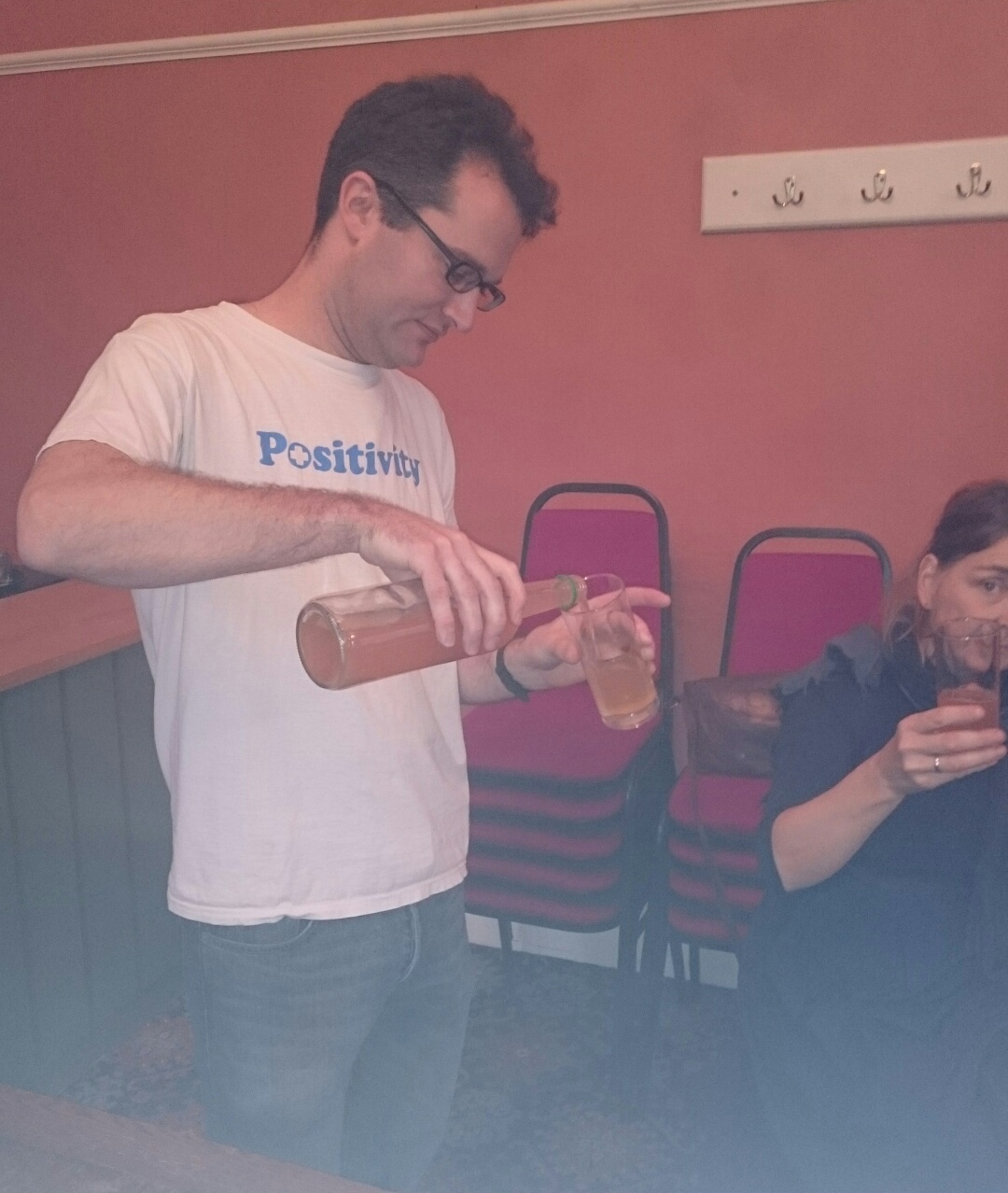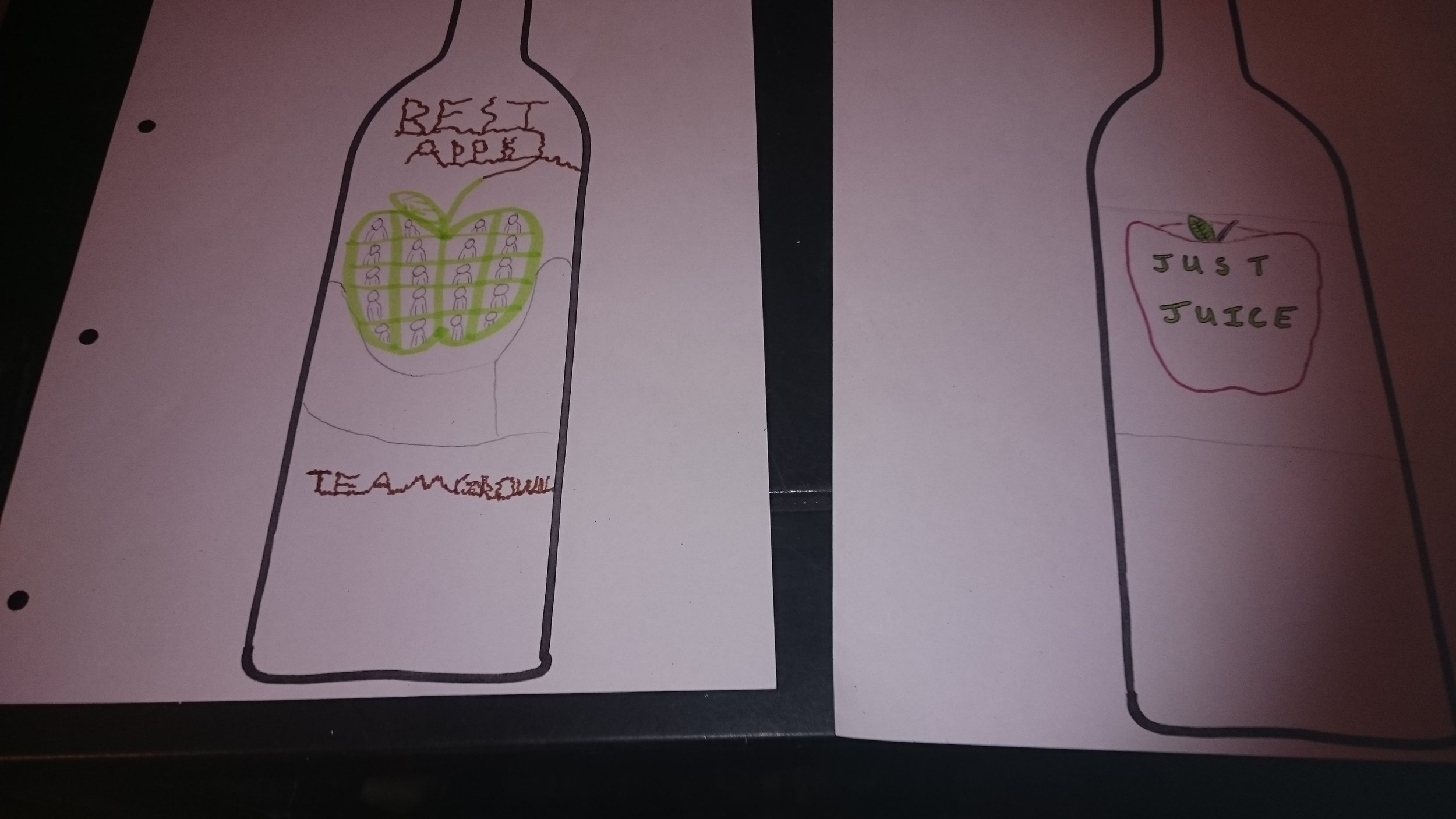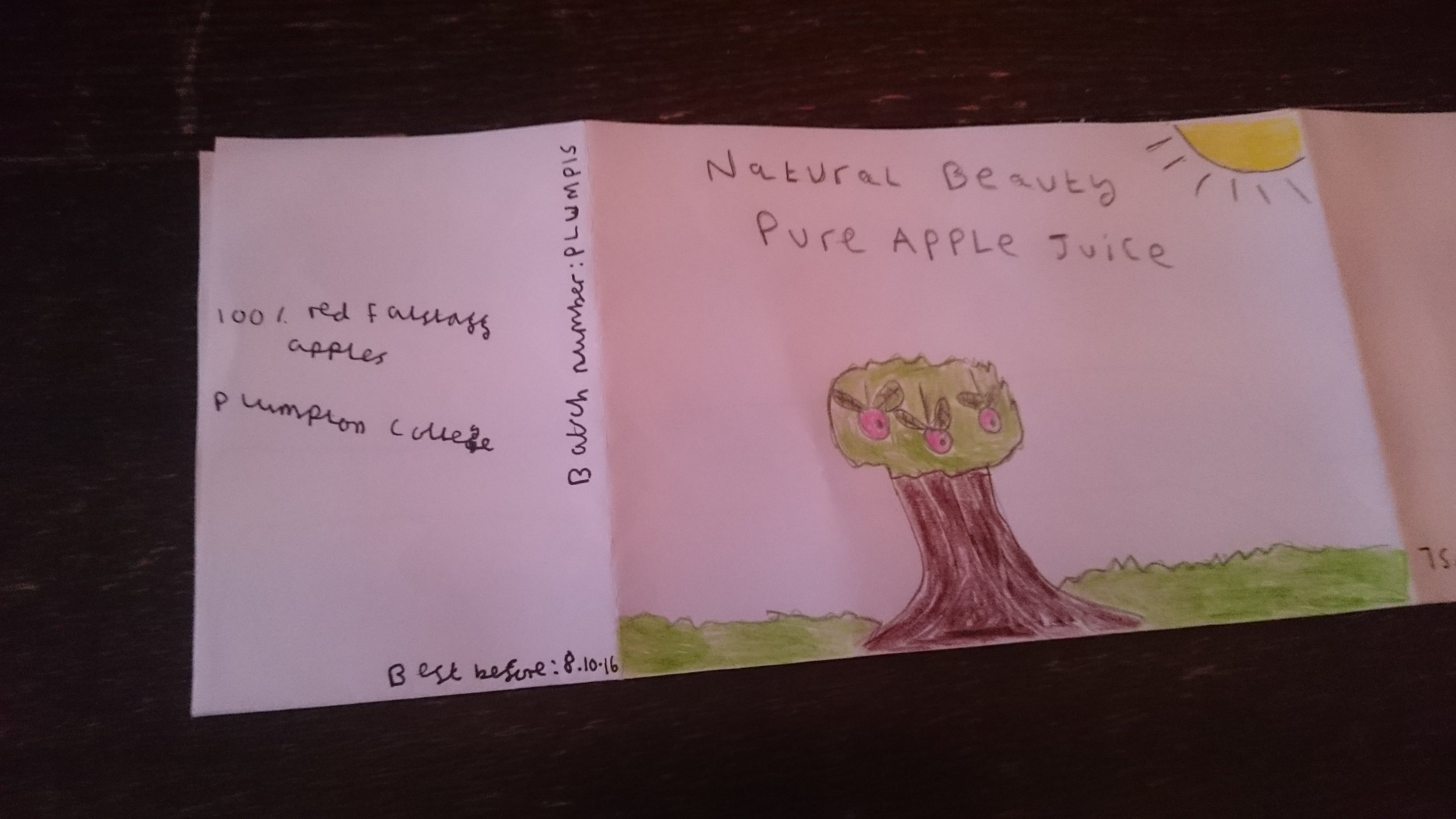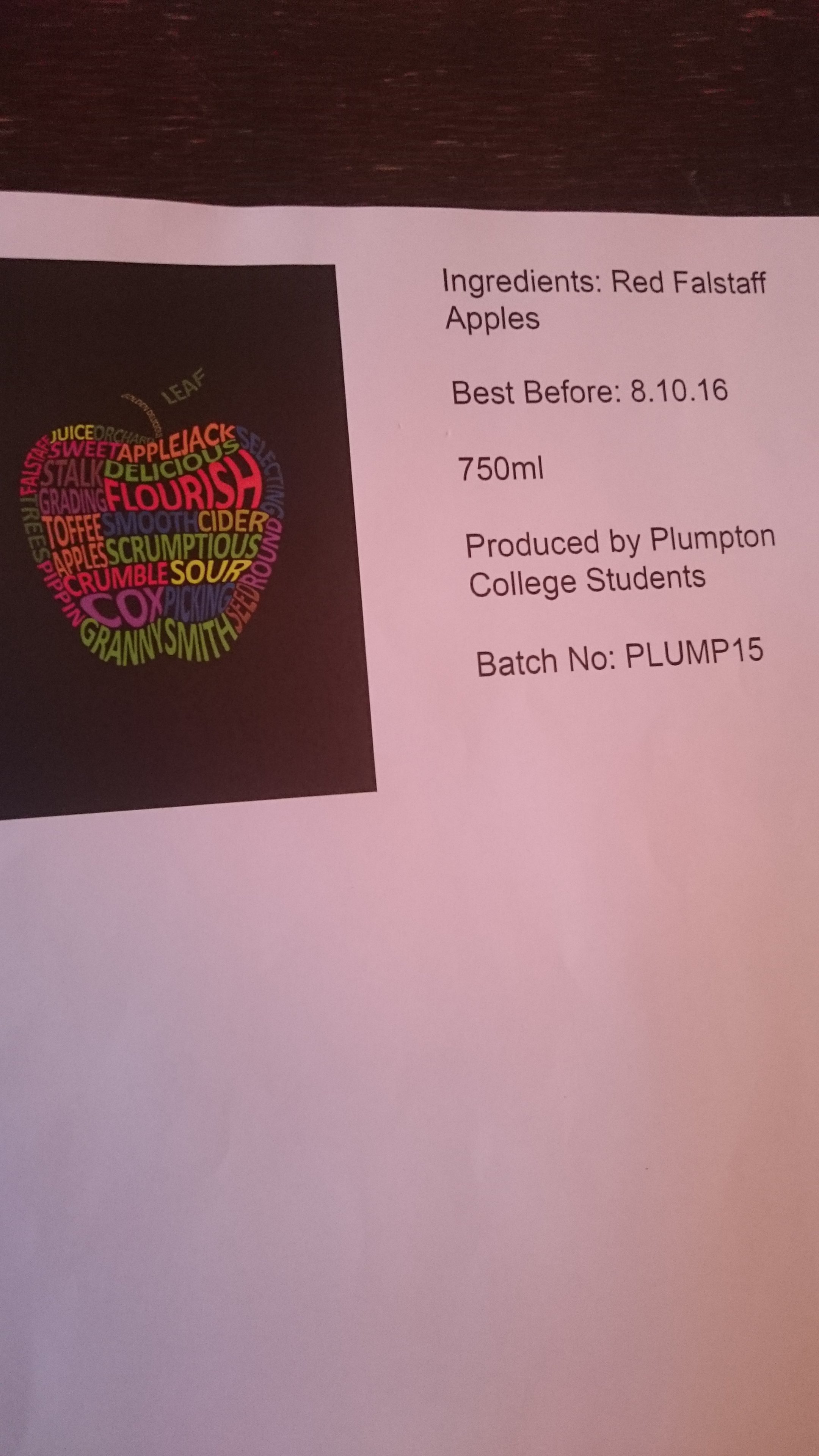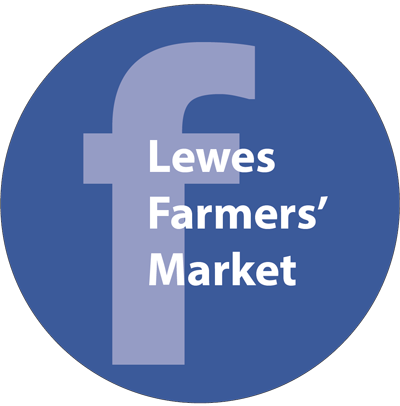Emma Chaplin
Fire and Feast at the Community Allotment. December 2016
We had a lovely time at our Fire and Feast event mid-December. It had been very wet the day before, but we were lucky that it was a sunny and beautiful day for this. The straw bales 'seats' were a little soggy and needed sheeting over them. We had two groups coming along. The St Nicholas Day Centre group in the morning, and Rural Pathways students from Plumpton College in the afternoon.
In the morning, the St Nicholas Day Centre group collected herbs for a bouquet as well as ivy to put on cards. Then we returned to the shelter to admire Sarah's fire, which had been tended by allotment member Maggie.
Once back at the shelter, with the herb bundles were tied and the ivy stuck to the cards, we stopped for refreshments. We drank apple juice pressed from Ringmer Community Orchard. Felicity Ann had brought some superb mince pies she'd made to share, and Sarah had cooked up delicious pumpkin soup for us all from an allotment pumpkin.
Then we toasted marshmallows on sticks on the fire.
Emma gave out allotment keyrings to all of the St Nicholas Day Centre members, because that's what they had asked for at the last Flourish user group meeting as a memento of the Community Allotment. The photos on it were of pumpkins, appropriately enough!
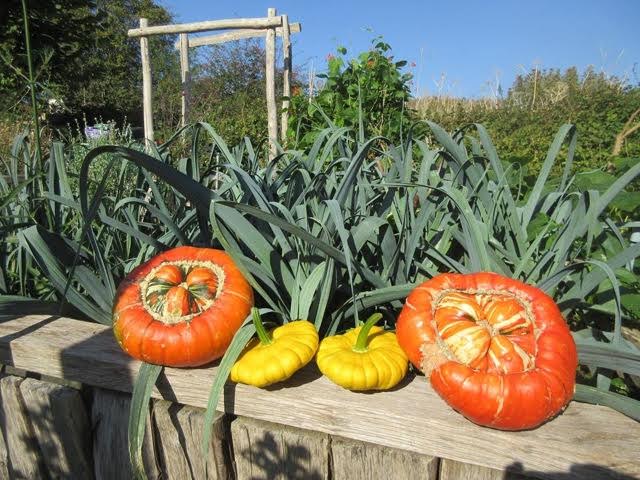
In the afternoon, the Rural Pathways students came along and also enjoyed a feast, inclduing toasting A LOT of marshmallows over the fire.
We all had fun. Many thanks to Sarah and Felicity Ann for all their hard work - and to all our allotment members and service users for their many contributions over the autumn.
Emma Chaplin
Day Two of our Apple Course with Plumpton - pressing the juice
Both groups came along on consecutive days to the Stanmer Park Fruit Factory in early October. The Fruit Factory is part of Brighton Permaculture Trust (BPT). Stephan Gehrels ran the days for us. The interns brought along the apples they'd picked from Ringmer Community Orchard on Flourish's apple course day one to be pressed, bottled and pasteurised.
Here is a video we made about this process
We had unpredictable weather both days, with some rain, but the interns were well-equipped in terms of raincoats, and the Fruit Factory has a nice indoor area we could use as well. It smelled deliciously of ginger because Stephan was cooking a big pot of it to be blended with some of BPT's juice made from apples from their local orchards.
Stephan welcomed everyone, told us about Brighton Permaculture Trust and talked about the work he does as BPT's Eco Schools Project Manager. He said the favourite part of his job is "working with young people and helping them understand how to protect the planet". The thing he likes least is: "paperwork and heavy rain".
He talked about making apple juice and apple vinegar - and how healthy it is. He covered health and safety issues, such as asking if everyone was feeling well that day, explaining people with long hair had to tie it back (essential in all food prep) and the importance of hand-washing. He told us where the toilets were and suggested we be careful not to trip over things, such as the hose or buckets.
Stephan showed us how to use the water lock on the hose, how to wash the apples and cut them up safely with a sharp knife. We were to discard any rotten bits and put them in particular buckets, which he said go to local pigs as food. Interns split into different groups to do different tasks, and switched around, so everyone got the chance to try activities they were interested in. The chopped apple pieces went into the big yellow mill or macerator, to chop them into bits, ready for juicing. The buckets of this chopped apple were then tipped into the hydro-press until it was full.
Then (for me!) the most exciting part, we got the hydro-press going to squueze all the fresh juice out of the apple pulp. We screwed the metal lid on tightly, then turned the hose (attached to the press) on. The hydro-press uses water pressure via a big rubber balloon in the middle of the pulp to squeeze all the juice out. Gallons of it poured out of the bottom lip into the buckets we put underneath. We had to keep an eye on them and change bucket every time one was nearly full.
Some of the raw juice was bottled and sealed by the students into plastic cartons to take home. It has to be drunk within a couple of days.
The groups also drank some juice 'raw' - each day we used various types of apple we'd picked (Red Falstaff on Day One, Ashmead's Kernel on Day Two) in different combinations to see if they tasted different. The day two mix including bramley apples, which gave a lovely tartness. the group also tried cider, after Stephan checked that everyone was 18 or over. The comments were:
LUSH
zingy
super, fresh
sweet
I will never shop at Tesco again
highly addictive
light
feels like it's doing you good
Then Stephan explained about how 'cooking' the juice in sterilised bottles will preserve it for up to a year, although it does change the taste. The groups poured juice from jugs into bottles, which then went (carefully) into the pasteurisers to be heated in hot water to the right temperature. So that's what we did with the rest of the juice.
Everyone worked hard and enjoyed themselves.
Then we broke for lunch, and in the afternoon, Peter May came along to show the groups around the Stanmer orchards.
Next stage: bottle label design and marketing - plus visits to a pub and a cider maker!
Emma Chaplin
Plumpton supported interns at Ringmer Community Orchard, year 2
The Flourish project began in September 2015, and one of the first things we did was to set up a three-day apple course working with a group of supported interns from Plumpton College. This took place at the beautiful Community Orchard in Ringmer. This is scheduled as an annual course, and we were pleased when Plumpton College said the year one group enjoyed it so much, that this autumn (2016), they wanted us to run the course for both Supported Internship classes.
So on 26 and 27 September, Flourish project manager Emma Chaplin and apple expert Peter May hosted two different groups at the Orchard for a day each of learning about apples; picking, grading, weighing and storing them ready for day two, juicing, of the Flourish apple course, which will take place at Stanmer Park in October hosted by Brighton Permaculture Trust*.
*Brighton Permaculture Trust "work with nature to sustain achieve a sustainable lifestyle". They are extremely knowledgeable about apples, have their own orchards, organise a huge Apple Day event every year and run lots of apple and fruit related courses. They also have apple pressing and pasteurising equipment.

Emma welcomed the groups at the Orchard on both days and talked a little about Flourish being a Lottery-funded project, managed by Common Cause Co-op. Everyone was shown where the toilets were and asked to wear a name label. Emma then said one thing she felt about apples (that she likes crumble!) and invited the group to introduce themselves one at a time with something they like or dislike about apples. On the first day, quite a few interns said they weren't keen on apples. On the second, most of the group liked both apples and apple juice - with several saying they particularly like cider!
Then Peter addressed the interns, explaining that the Orchard growing season has been different from last year, and the apples are two weeks behind in terms of ripening.
The interns asked if each group could pick different varieties, so that they could compare the taste of each once they are juiced at Stanmer Park in October. Peter said that would be fine - the first day would be picking Ashmead's Kernel, the second, Red Falstaff.
Peter gave a tour of the apple store and the Orchard. He said the Orchard has rich soil from when horses grazed here in the past. He explained the differences between a tree nursery and an orchard. An orchard will feature lots of apple varieties which are grown to last for years.
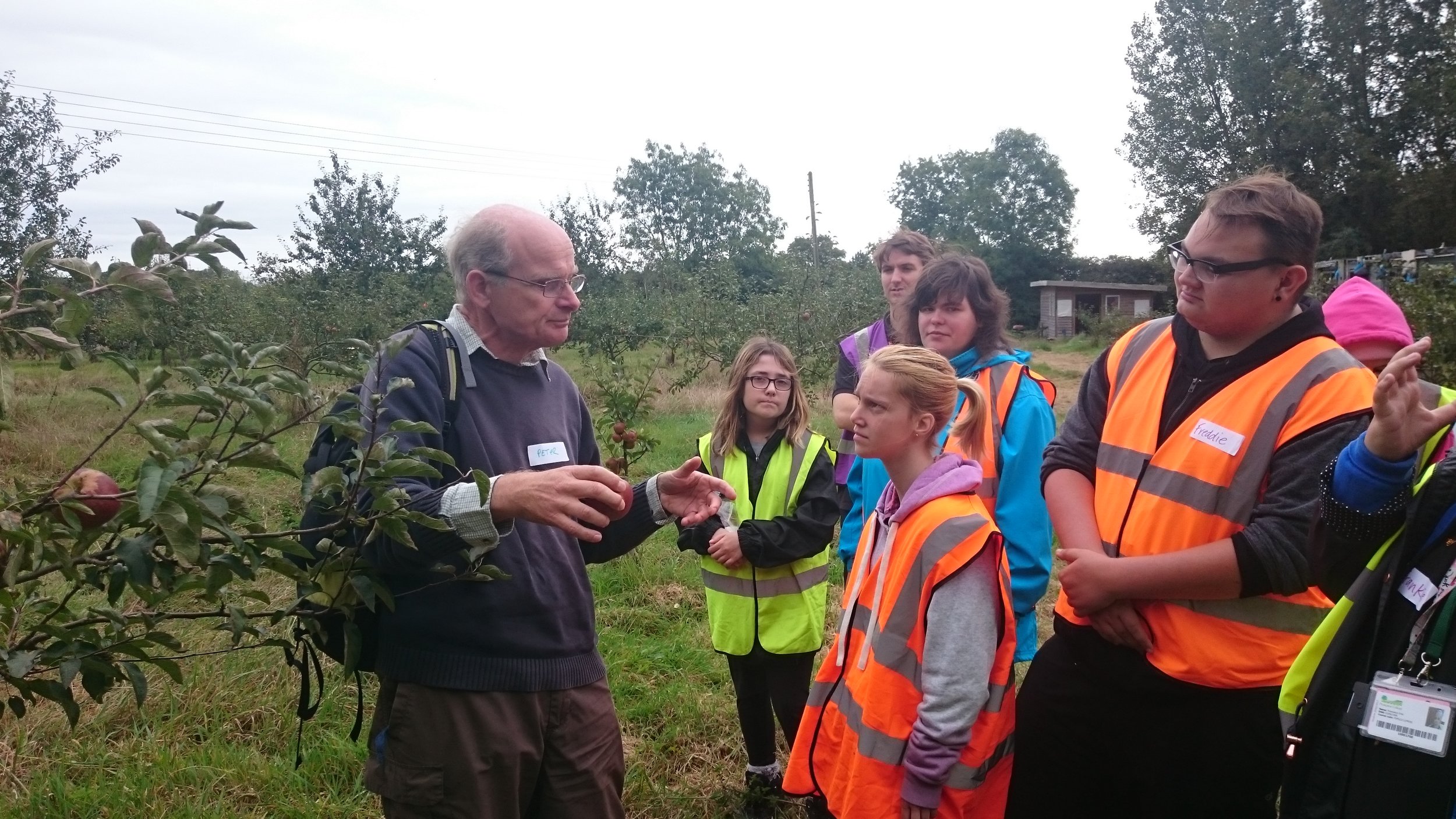 When the Orchard was being planned, he explained, each bush apple tree was planted 5m apart, with 7m between rows, to allow the trees room to grow. They allowed 10m for larger varieties.As we walked round, he pointed out several trees that are leaning, and said that is partly because they grew so vigorously and strongly the roots couldn't keep up - plus the added factor of the wind. He also mentioned that the Orchard also has some pear trees as well as a new quince and some plum trees.
When the Orchard was being planned, he explained, each bush apple tree was planted 5m apart, with 7m between rows, to allow the trees room to grow. They allowed 10m for larger varieties.As we walked round, he pointed out several trees that are leaning, and said that is partly because they grew so vigorously and strongly the roots couldn't keep up - plus the added factor of the wind. He also mentioned that the Orchard also has some pear trees as well as a new quince and some plum trees.
"You have to think about thirty years' time when you're planning an orchard"
He then talked about his career, and how interesting an apprenticeship was - trying various jobs in different departments, learning new skills, getting a sense of what worked for him. He explained that working for a commercial orchard might include working with equipment or in glass houses or polytunnel indoors.
"What employers are looking for", he explained, "is enthusiasm and lots of energy and for people who are prepared to work outdoors in all weathers"
Peter said that pesticides and chemicals are not used on the trees in the Orchard so many of the apples are lumpy and bumpy - unlike fruit you get from commercial orchards.
Some interesting apple facts that Peter pointed out:
- This is a post that Peter wrote last autumn about the different varieties of apples at the Orchard. Ones we looked at include: Newton Wonder, Edward VII, Lord Lambourne, Scrumptious, Ashmead's Kernel, Red Falstaff and Salt Cote Pippin.
- There are 10,000 apple varieties in the world
- There are 2,500 varieties in the UK alone
- A number of varieties are named after places and people
- Apples originate from Kazakhstan
- New varieties are always being developed - designed to be disease-resistant etc
- Apples probably arrived in the UK when the Romans invaded
- Some varieties ripen early, some late
- Some have a lot of apples every year, others alternate years
- The texture and taste of all the varieties varies. Some are sweet, some sharp. Some are eaters, some are good for cooking
- It varies as to how well they store
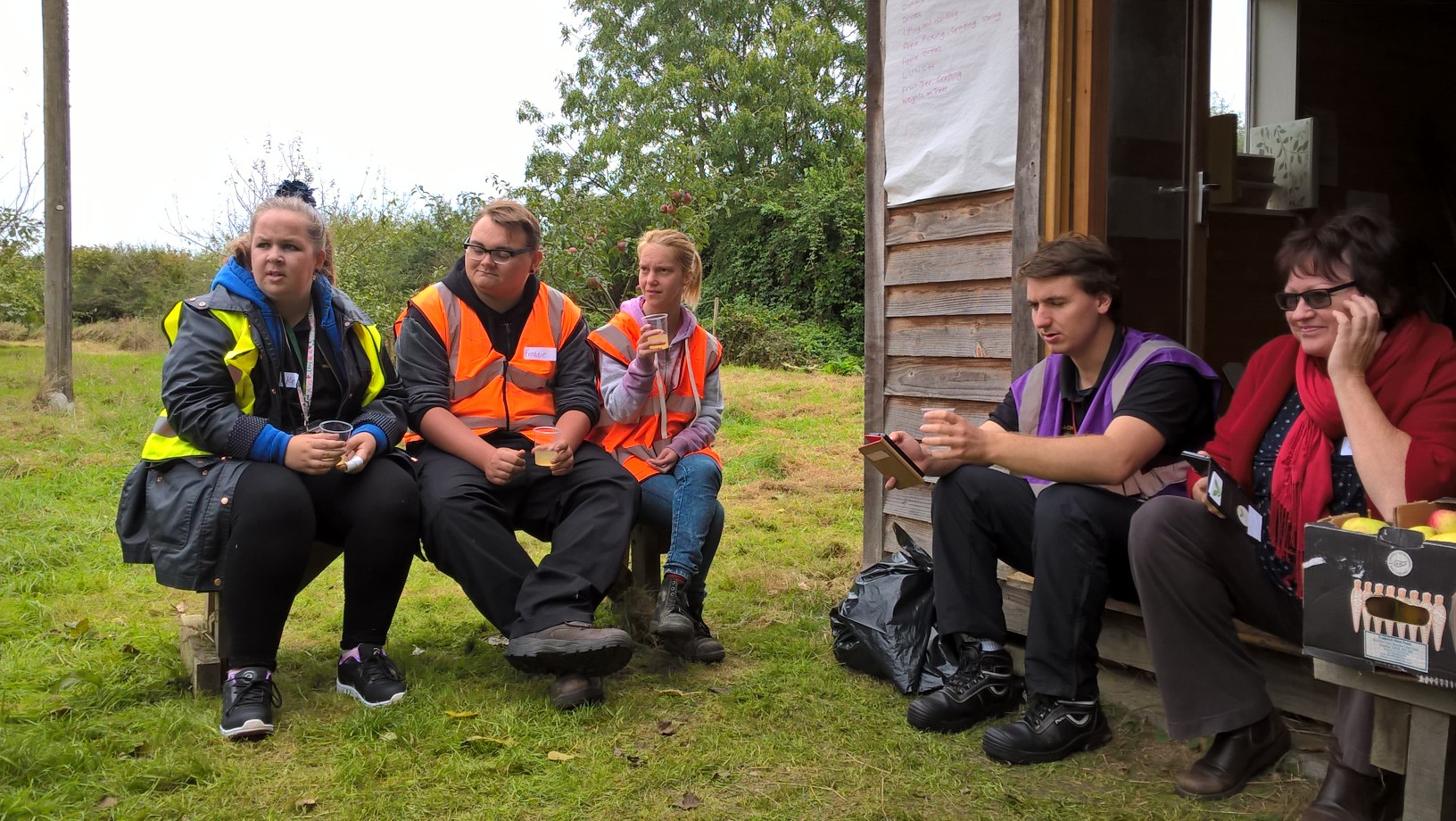
He offered members of the group different vintages of juice, from various varieties of apples picked in previous years. One intern said it was "Like drinking liquid sunshine".

Then the group were shown safe lifting and handling techniques, and they began work - with one group picking apples, one group grading them, with others taking them to the apple store in the wheelbarrow.
After lunch, the groups made up several 'orders' of apples, as if for a shop, using weighing scales.
Peter then showed the group how to hang small cement weights on the ends of the boughs of some young apple trees, a technique which bends the branch down and encourages the tree to produce more fruit.

Peter finished the afternoon off by demonstrating how to graft a new apple tree.
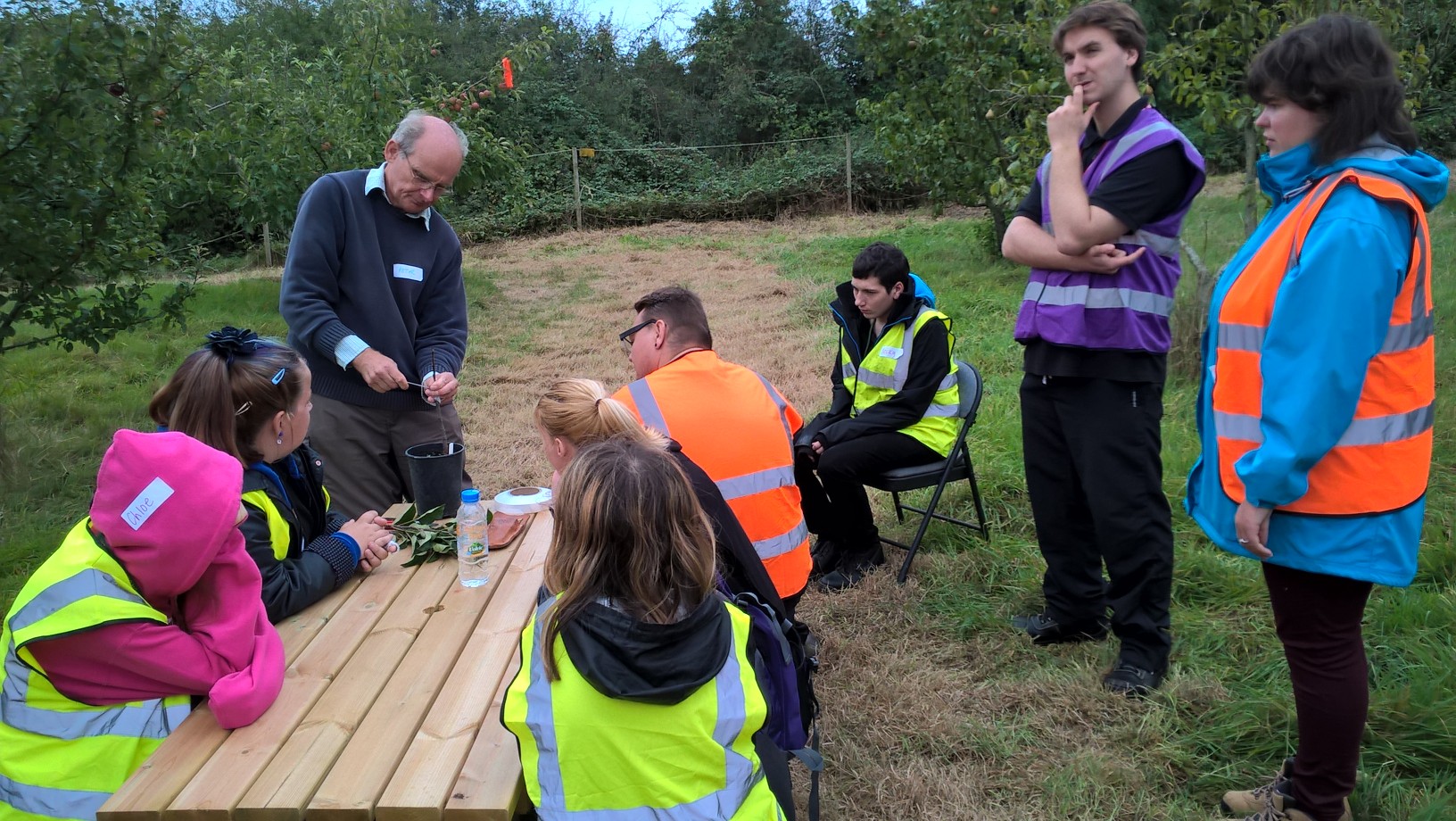
Next stop, Brighton Permaculture Trust to juice, bottle and pasteurise the apples - and taste the juice of course.
Emma Chaplin, Sept 2016
Video of Brandon at Ringmer Community Orchard
Apple blossom time at Ringmer Community Orchard
Peter gave us an update on orchard news.
- There are 24 types of apples varieties growing at the orchard, plus five pear and four plum.
- Planting cherry trees has been discussed with the members, but decided against, because the birds would get most of the fruit. Having apricots and peach trees has also been discussed - some growers have planted these on the High Weald, but it's felt that the community orchard is not the right place for them.
- Nearer the carpark, apple trees have been planted whose rootstock is better suited to the damper conditions there.
- A new quince tree has been planted this year.
Becoming a member of Ringmer Community Orchard
There are currently about 30 members, with more joining every year. We always welcome more people and their families.
Membership costs £25 per annum if people put in six hours work at the orchard per year, or £30 to adopt a tree - with no requirement to help out.
Apple juice label - final design from Plumpton
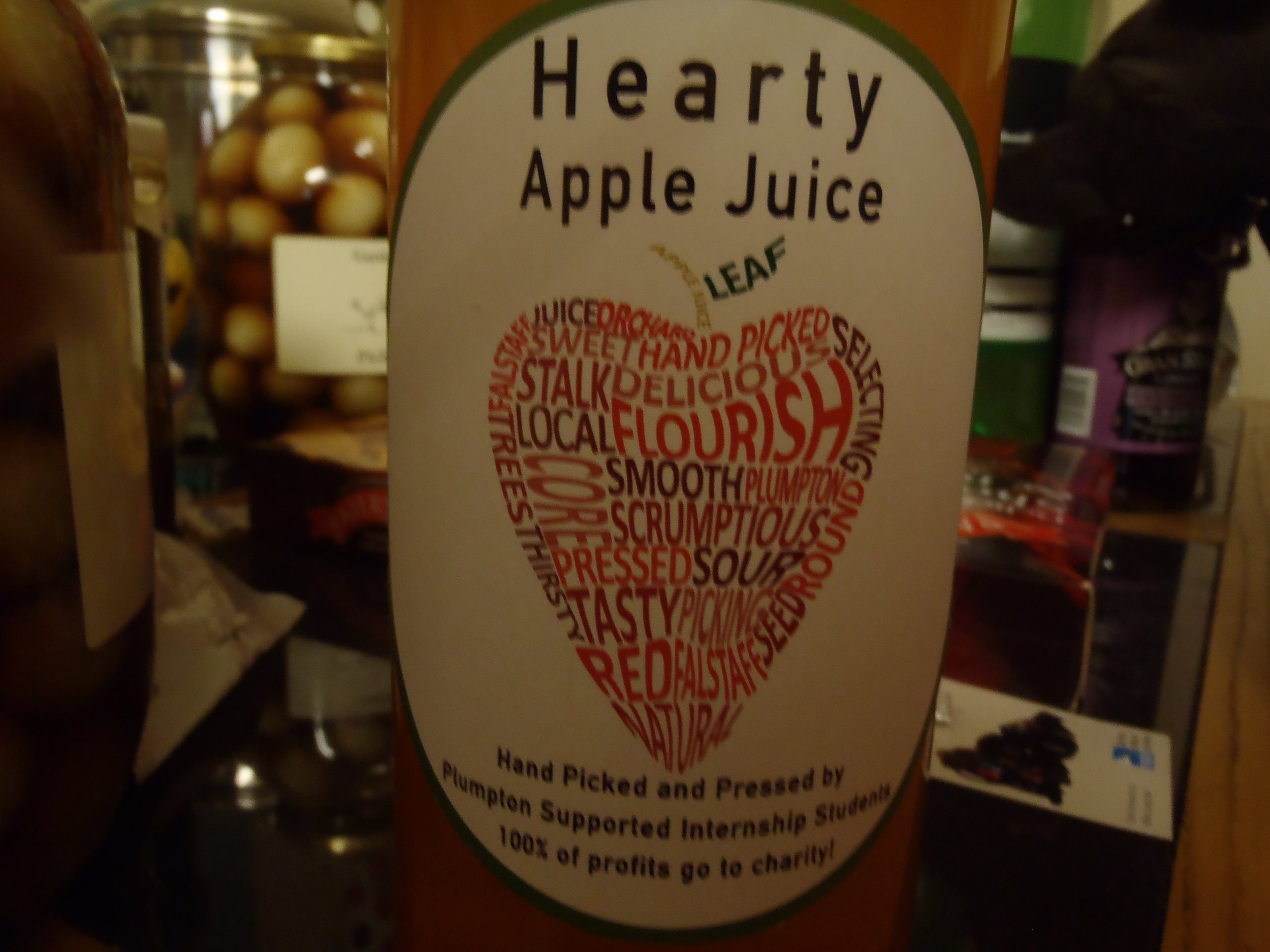
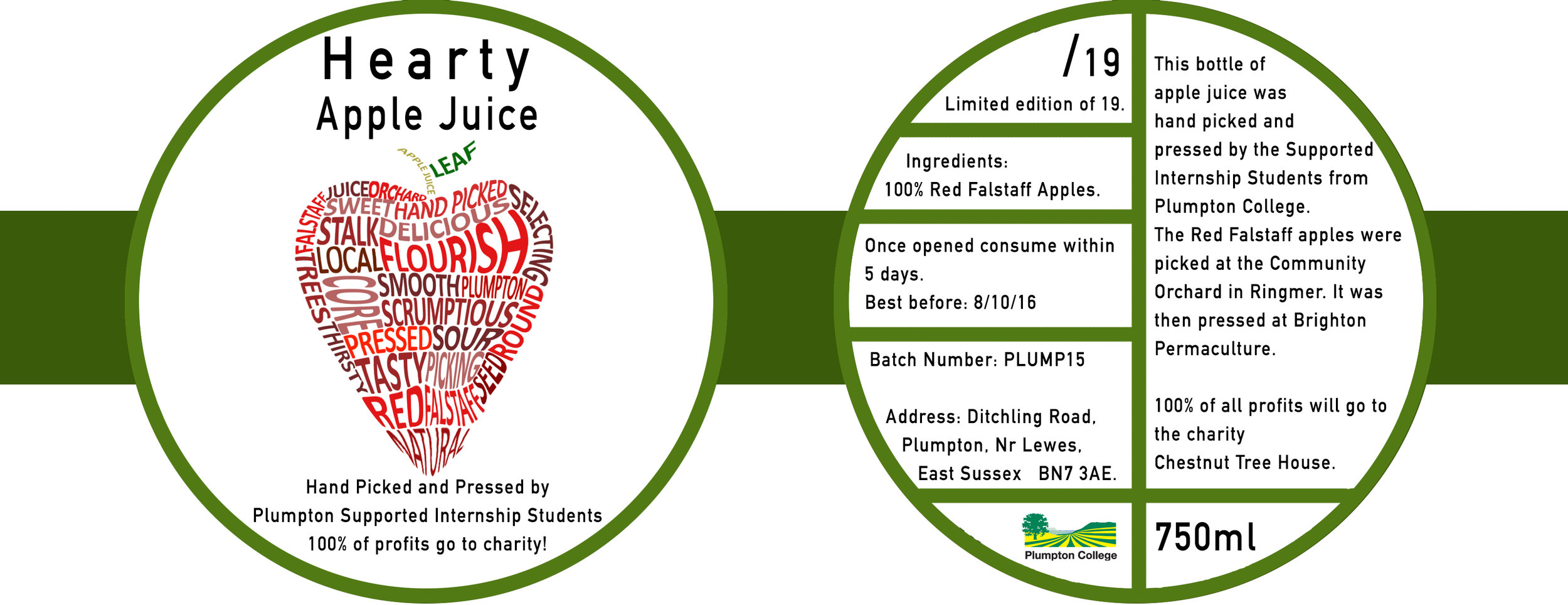 This is the final Ringmer Community Orchard apple juice label, designed by the Plumpton College supported interns with the assistance of the wine department. Read all about how it was produced here. We think it's great. Well done all.
This is the final Ringmer Community Orchard apple juice label, designed by the Plumpton College supported interns with the assistance of the wine department. Read all about how it was produced here. We think it's great. Well done all.
EC
Our three day course with Plumpton College Supported Interns
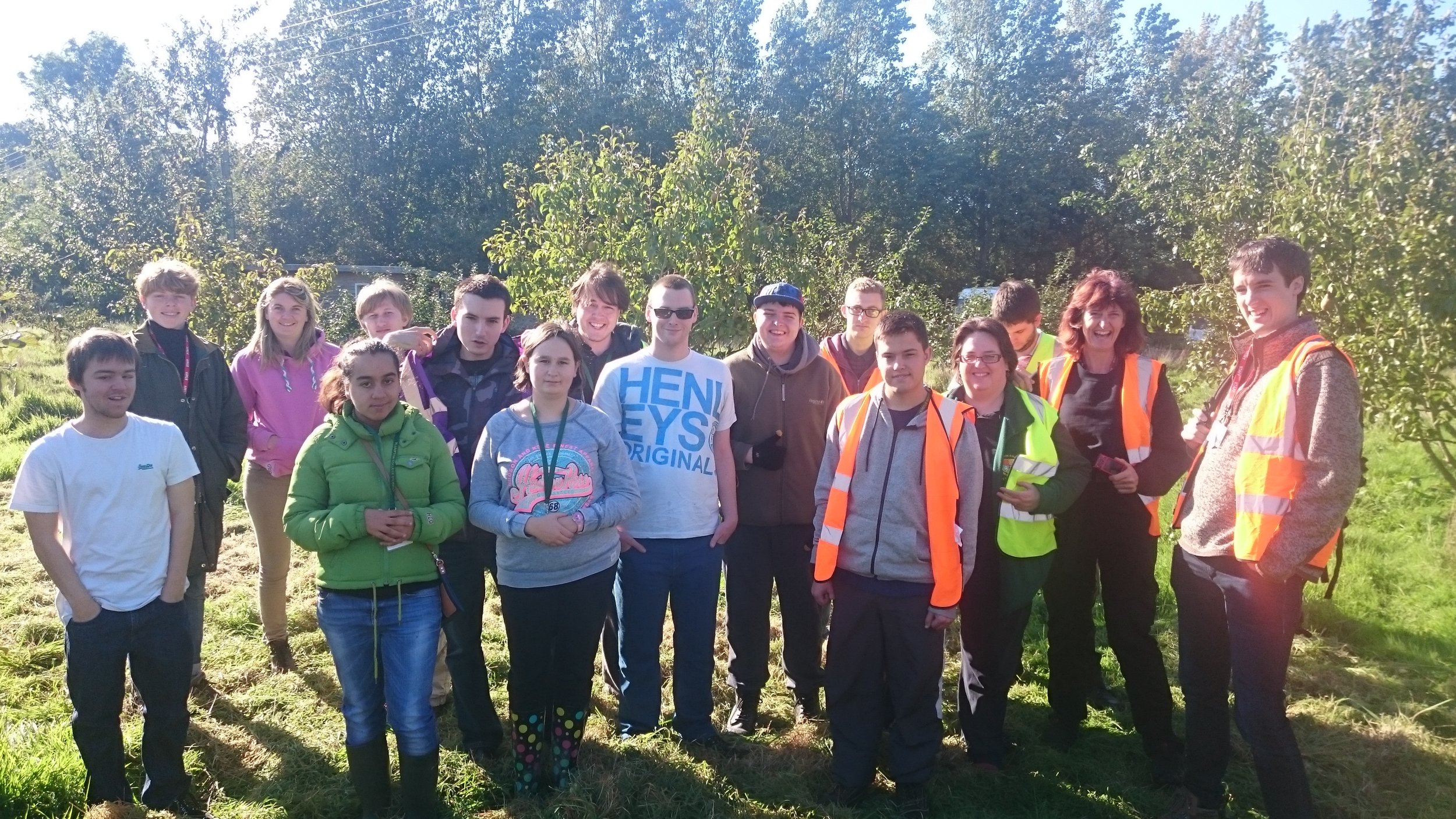
Ringmer Community Orchard, under the guidance of Common Cause director Katharine Finnegan, has become a thriving orchard over the years, with many varieties of apple trees and other fruits. Flourish came into being in September 2015, and one of the first tasks of project manager Emma Chaplin was to create and carry out a three-day course based around these apples for the class of fifteen Plumpton College supported interns.
This Emma did in consultation with apple expert Peter May, Plumpton supported interns course leader Mel Simmonds, and others.
Day one
This took place at the end of September at Ringmer Community Orchard. The day was run by Peter May, supported by Emma and several Plumpton support staff, including Mel and Nikki Sanger. During the day, Peter talked to the group about how apples grow, how many different varieties there are, plus offering advice on safe handling of heavy items. From Peter, the interns learnt how to pick, grade and weigh the Red Falstaff apples. There were also discussions about what working in the fruit picking industry might entail and what qualities you might want for such roles.
Day two
This took place at the beginning of October at Brighton Permaculture in Stanmer Park. Peter May and Emma Chaplin brought along the apples the students had picked at Ringmer Orchard. Stephan Gehrels of Brighton Permaculture led the day, demonstrating and supporting the interns in how to wash, macerate and press the apples using the hydropress. He also answered any questions the students had about the process.
Everyone tasted the freshly pressed juice - and said they thought it was delicious. The interns poured half of it into cartons. A passer-by bought a carton of it from intern Gemma.
Stephan talked about bottling apple juice, adding flavours, what labels are added. He also showed the interns the cider press. Then the interns bottled the rest of the juice into 19 bottles, which they then pasteurised, to make the juice longer-lasting. The interns took these home with them.
The day ended with a Stanmer orchard tour by Peter May.
This was some of the feedback we got after days one and two: "Grading of apples, picking and storing was really interesting." "The orchard tour was really good". "The fresh apple juice was much better than shop bought". "Learning the different names of the apples was interesting". "I liked learning how to make juice and tasting it". "The people were passionate about their project, this was contagious".
Next...
The interns went back to college to design labels for their bottles with their resident expert graphic design tutor. They had advice and examples from Stephan and Emma about what the bottle labels needed to include, and graphic designer Neil Gower (who has designed beer bottles, amongst many other things) contributed advice on good label design.
Day three 
This was split into two. The interns came by bus to Lewes at the beginning of December with Nikki Sanger and Mark Gilbert as support staff plus others, where Emma met them off the bus.
They visited the Elephant and Castle pub, went upstairs to the function room where landlord Huw Jones spoke to them about running a pub, how he came to be a pub landlord, what jobs there are in pubs and what qualities you need to do them.
The students had prepared a large number of questions for Huw, which he was able to answer very helpfully.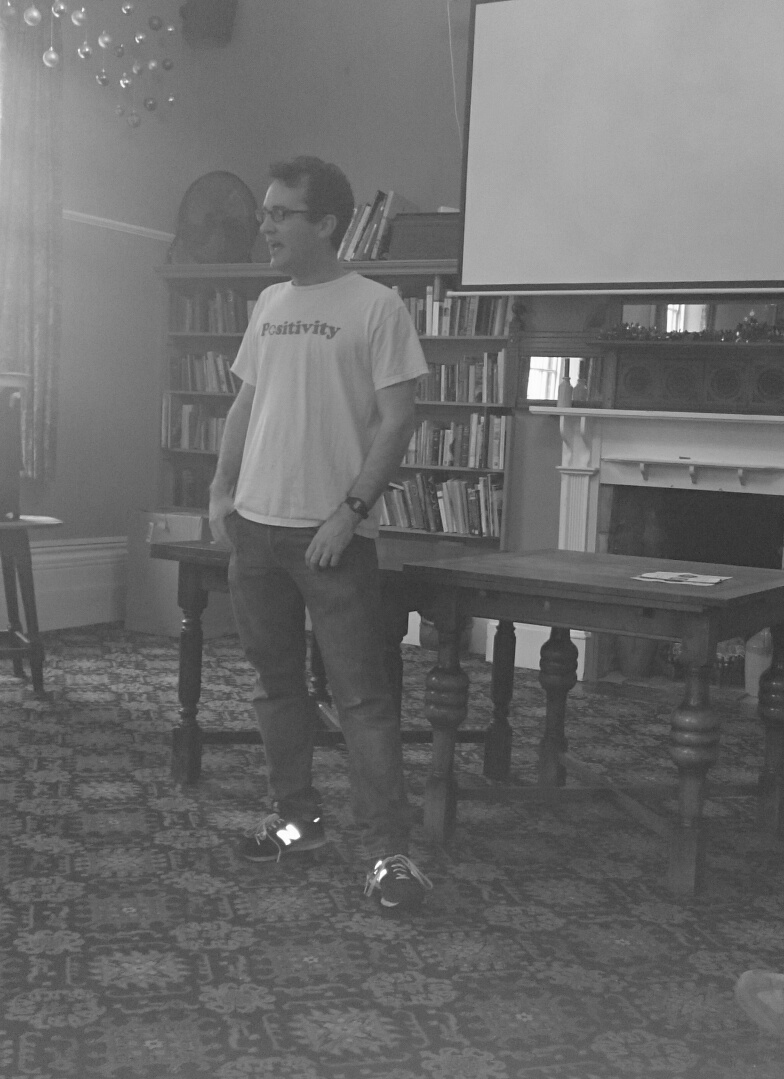 Sara Grisewood from Pleasant Stores came and joined the group and told them about her local vegetarian cafe/shop business. Then Huw and Sara tasted the apple juice, gave incredibly positive feedback about the taste and how good a product it is. They said there were so many factors that would work for them as buyers – the fact that it's made by Plumpton interns, is limited edition, from a single variety of apples grown locally, that no chemicals used in the process or used on the apple trees. They said they would definitely stock it if they could.
Sara Grisewood from Pleasant Stores came and joined the group and told them about her local vegetarian cafe/shop business. Then Huw and Sara tasted the apple juice, gave incredibly positive feedback about the taste and how good a product it is. They said there were so many factors that would work for them as buyers – the fact that it's made by Plumpton interns, is limited edition, from a single variety of apples grown locally, that no chemicals used in the process or used on the apple trees. They said they would definitely stock it if they could.
They also explained how much they’d pay for a bottle, and how much they’d charge if they were selling it on.
They gave feedback on all the label designs the students had come up with.
Sara talked about products she stocks and, on the way back to the bus stop, the interns dropped into Pleasant Stores, where she showed them some labels of her drinks.
Final half day
The next day, Emma went to Plumpton College and talked to the students about Twitter – what it is, how to use it effectively, how to be safe on Twitter. She answered questions about tweeting, then gave a handout on this. She also presented the interns with certificates of attendance for the whole three days of the apple-based course.
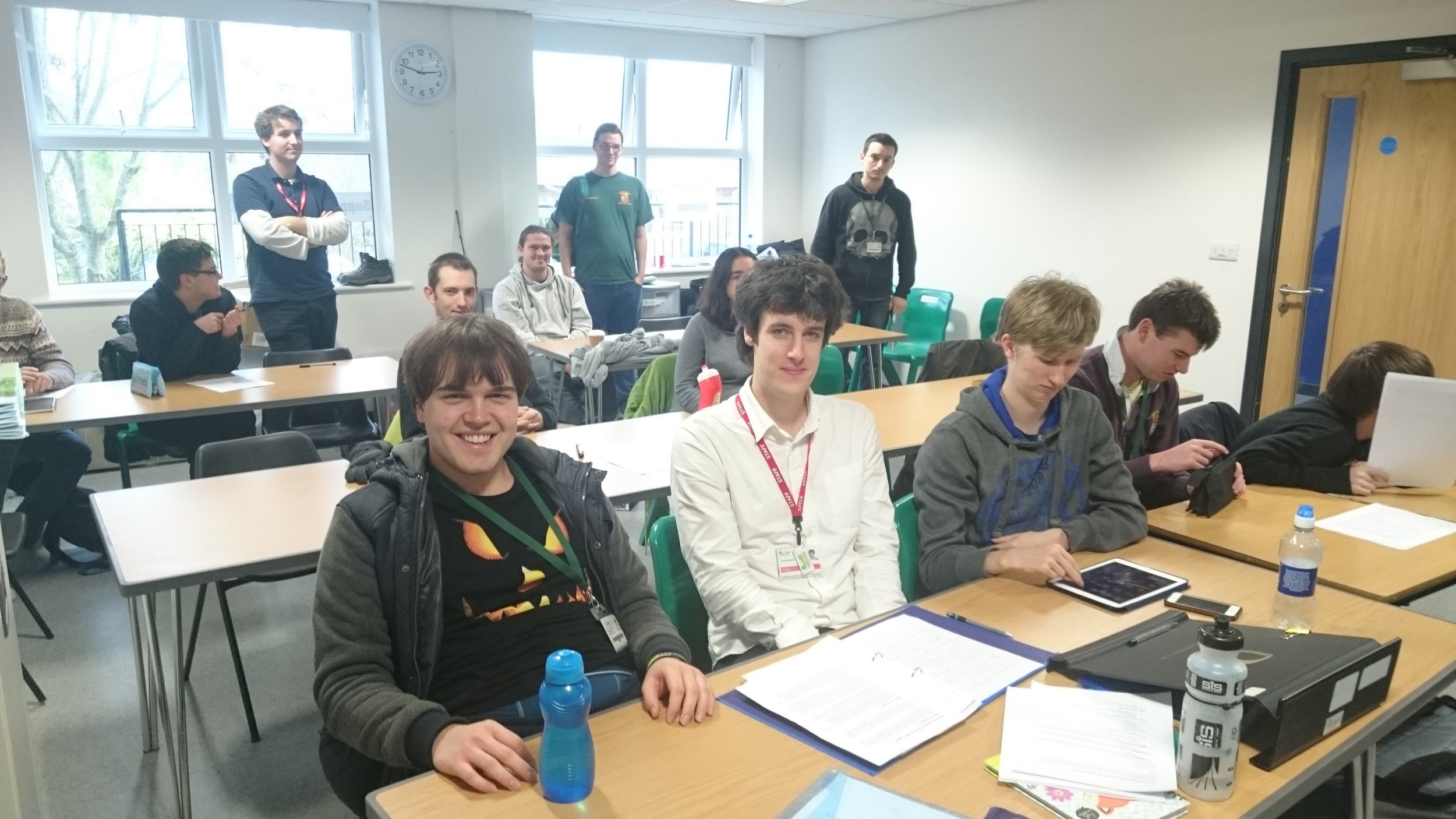
The final outcome of this project will be that the interns will work with the wine department at Plumpton to produce the labels, based on the best bits of an amalgam of designs. Watch this space for that.
The juice will be sold at the Plumpton College Christmas Fair, with all money raised going to Chestnut Tree Hospice.

